Welcome to the 2023 Catalogue
Featuring over 400 books and resources from decodables to dictionaries and practice books to posters, the latest edition of the Schofield & Sims catalogue showcases a growing range of time-saving and cost-effective educational resources for teachers, tutors and parents.
Instil a love of reading with real stories
My Letters and Sounds is our brand-new DfE-validated systematic, synthetic phonics programme. Taking the very best elements from the popular Letters and Sounds framework, it provides everything that educators need to deliver high-quality phonics teaching, including daily lesson plans, write-in pupil practice books, and over 1,000 physical and digital resources.
Central to the My Letters and Sounds programme are 110 brand-new fully decodable readers. Perfectly matched to the lesson plans, each story has been written and illustrated with loving care, not just to ensure that children have extensive practice of all the GPCs and tricky words taught, but to engender a true love of reading.
New homework resources
Arriving later in 2023 will be the Primary Practice series, a yearly homework resource for English and maths. Ideal for use at home or in the classroom, the books will use a mastery approach to help children develop a deep understanding of key concepts and methods as they progress from Reception to Year 6.
The books will use step-by-step practice organised into topics to develop children’s understanding of all the skills and knowledge set out in the National Curriculum programmes of study. Complete answers, accompanied by detailed explanations, will be available to download for free so that parents and carers can support children’s learning at home.
Kind regards, Nick
Platts ChairmanMy Letters and Sounds
Schofield & Sims My Letters and Sounds is a brand-new systematic synthetic phonics (SSP) programme built around 110 stunning, fully decodable readers together with a wealth of teaching guidance and resources The scheme has been carefully developed to provide schools that want to use the Letters and Sounds framework with an up-to-date and comprehensive set of resources that meet the Department for Education’s (DfE) revised core criteria for

What is included in the programme?
Teacher’s Handbooks with daily lesson plans and photocopiable resources. See pages 14–17.








Physical versions of some of the most popular resources, including friezes and mnemonic flashcards. See page 27.

110 fiction and non-fiction fully decodable Phonics Readers.
See pages 20–26.

Workbooks help children practise phonics skills at home and in class. See pages 18–19.



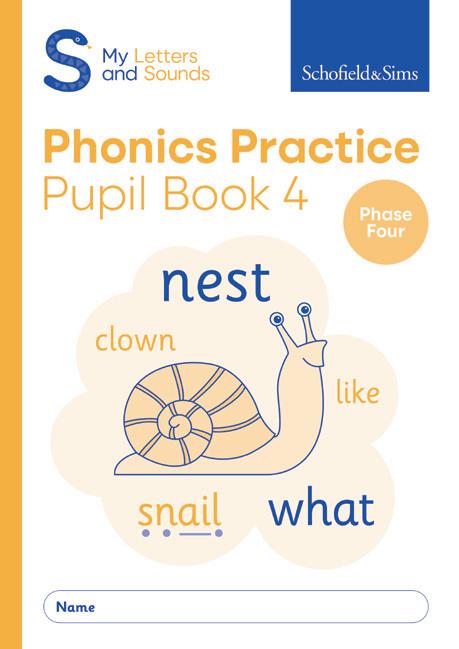
Early years resources | Reception
Get Set Teacher’s Guides
Sophie Le Marchand and Sarah ReddawayGet Set Early Years is a comprehensive and engaging early years programme that aims to bridge the gap between play and formal learning, helping all children to be school-ready by the end of Reception It links directly to the Early Years Foundation Stage (EYFS) framework, with a particular focus on the specific areas of Literacy, Mathematics and Understanding the World For each of these areas, there is a teacher’s guide full of inspiring activity ideas that cover all the expected Early Learning Goals (ELGs), and corresponding activity books for parents or carers to complete with their child at home
The Get Set teacher’s guides provide a wealth of learning opportunities and practical resources based around play, exploration and discussion that slowly build in more formal elements of learning The books also promote strong home–school links, not only through close correspondence with the activity books, but by providing a variety of additional resources designed to encourage a strong partnership between school staff and parents

Talking points prompt conversational exploration of the topic and help build vocabulary.
There is gradual progression from unit to unit and from term to term.
Activity sheets include a wide range of hands-on learning resources such as cards, games and puzzles.
As the units progress, the Go activities slowly introduce elements of more formal learning.

Each Get Set teacher’s guide contains 39 structured units, one for each week of the school year, that develop children’s knowledge and enjoyment of the relevant ELGs
All the unit plans follow a consistent format, comprising:
• Introductory panel – featuring a description of the learning objective with links to the ELGs, together with key and further vocabulary that will be covered during the unit
• Get set activities – three activity ideas to help you introduce and invite exploration of the topic through practical and playful means
• Go activity – a further activity with an accompanying photocopiable resource allowing children to explore the topic in more depth
• Cross-curricular links – clear references to other EYFS curriculum areas that children may be actively engaged in through the activities in the unit
• Home link – references to relevant pages in the activity books

All three teacher’s guides also include general guidance on delivering and assessing the EYFS curriculum, alongside a range of supporting photocopiable resources
Additional photocopiable resources can be given to parents and carers to support learning at home.
Get Set Mathematics Teacher’s Guide 978 07217 1435 6
Get Set Literacy Teacher’s Guide 978 07217 1440 0
Free downloads
Further Get Set Early Years resources are available as free downloads from the Schofield & Sims website, including:
• Termly vocabulary lists
• an Observation form to help teachers record evidence of ELGs
• a Learning diary to help facilitate home–school communication
• a Grapheme–phoneme correspondence chart and Phonics glossary
• a Handwriting chart showing letters of the alphabet and numerals from 1 to 9

• a Letter formation patter chart
• a full Recommended reading list
Get Set Understanding the World Teacher’s Guide 978 07217 1446 2
Dotted or shaded lines guide children through the activities.

Pages are clear and uncluttered with engaging illustrations to capture the child’s imagination.
Get Set Activity Books
Sophie Le Marchand and Sarah ReddawayThe Get Set activity books complement the learning and development opportunities offered in the Get Set teacher’s guides, providing fun activities, vocabulary and tips for use with children in their Reception year Active parental or carer involvement in a child’s education has long-lasting benefits to their learning as they progress through school, and the Get Set activity books are an ideal way of strengthening links between school staff and parents, and encouraging consolidation of learning at home
There are 12 Get Set activity books in total that together cover all the Early Learning Goals (ELGs) for Literacy, Mathematics and Understanding the World The activities in the books link directly with the units in the teacher’s guides, thereby reinforcing the learning that takes place at school They also provide parents and carers with a clear understanding of the topics and vocabulary that their children are learning in school, as well as an idea of the expectations for children at this age
The activity instructions are written in concise, child-friendly language that should be read aloud to the child by an adult.

Each activity book page contains two activities for the child to complete Carefully designed to be as engaging and varied as possible, the activities include matching, complete the picture, connect the dots, mazes, picture sequencing, colour by sound, odd one out and many more

To further promote home learning, helpful notes are provided at the back of each book in a detailed table that parents and carers can refer to while working through the book with their child For each page of the activity book, the following information is given:
• Teaching tip – a useful educational tip offering guidance to parents and carers on how best to support their child as they complete the activities

• Key vocabulary – a selection of important key vocabulary for parents and carers to use with their child when discussing the topic
• Extension activity – a suggestion for an additional practical activity that explores the topic in a real-life context to further challenge the child and enrich their learning
Activities increase in difficulty as children work through them, progressing at the same speed as the units in the teacher’s guides.
Notes for parents and carers provide ideas to extend children’s learning.
AGES 4–5
RRP £4.95
Counting 978 07217 1436 3
Adding and Subtracting 978 07217 1437 0
Shape and Pattern 978 07217 1438 7
Space and Measure 978 07217 1439 4
Reading and Rhyme 978 07217 1445 5
Letter Sounds 978 07217 1441 7
Phonics 978 07217 1442 4
Writing Letters 978 07217 1443 1
Writing Words 978 07217 1444 8
People 978 07217 1447 9
The World 978 07217 1448 6
Technology 978 07217 1449 3
The books are attractively presented with colour illustrations and a typeface specifically designed for young readers.
Daisy Lane Home–School Readers
Carol MatchettThe Daisy Lane Home–School Readers for Young Children and Pre-school Children are lively stories for children and adults to enjoy together They have been specially written by a teacher to support children’s first steps in literacy Each story takes place in and around Daisy Lane and focuses on two young children, Ollie and Jazz – a brother and sister with whom young readers will quickly identify
The Daisy Lane Home–School Readers for Young Children are aimed at children who have not yet started to read but show an interest in books, while the Daisy Lane Home–School Readers for Pre-school Children are suitable for Reception-age children who are just starting to read independently Ideal for use as home readers, both sets of books may also be used for group or independent reading in class All the stories support the Literacy Early Learning Goals in the Early Years Foundation Stage framework and will sit comfortably with any other readers that your school may already be using
Sound Stories use rhyme and alliteration to focus on the sounds made by different letters.
Free downloads available
Daisy Lane Home–School Readers for Pre-school Children:
Silly bear, Boris Bear! (Sound Story) 978 07217 1101 0



Max’s monster meal (Sound Story) 978 07217 1102 7
Toy trouble (Sound Story) 978 07217 1103 4
In the shed (Key Word Story) 978 07217 1104 1
I can do that! (Key Word Story) 978 07217 1106 5
The Daisy Lane readers feature two different types of stories: Sound Stories and Key Word Stories The Sound Stories develop early phonological awareness and knowledge of the sound–symbol relationships using rhyme and alliteration, while the Key Word Stories encourage recognition of common high-frequency words through pattern and repetition


To support parents and classroom assistants in guided reading sessions, every reader includes concise and clearly written notes for adults that not only consolidate reading skills and strategies taught in the classroom, but also encourage discussion and help develop children’s language and comprehension skills
Further guidance on helping children as they learn to read can be found in the Home–School Guide to Reading with Pre-school Children and the Home–School Guide to Reading with Young Children Perfect for parent induction meetings and reading workshops, the guides contain simple explanations of the process of learning to read and are full of ideas for encouraging early literacy, using books, the text that surrounds us and everyday objects
Free downloads
A separate Daisy Lane Reading Profile is available as a free download from the Schofield & Sims website to help teachers in Reception classes gather information about children’s reading
Designed to accompany the Daisy Lane Home–School Readers for Young Children, this eight-page, A4 booklet contains transcripts of selected sections of the text of each of the six books at this level, a note of the sounds and key words focused on, and some key questions to ask children to check their understanding
Home–School Guide to Reading with Young Children 978 07217 1107 2
Key Word Stories reinforce high-frequency words for the Reception year.
Daisy Lane Home–School Readers for Young Children:
Helping Harpo (Sound Story)
978 07217 1108 9
What a laugh! (Sound Story) 978 07217 1109 6
Zap! (Sound Story) 978 07217 1110 2
Can I come in? (Key Word Story)
978 07217 1111 9
Look at this! (Key Word Story) 978 07217 1112 6
Lost and found (Key Word Story) 978 07217 1113 3
Nursery Activity
Kathryn Linaker
The Nursery series is a range of colourful and fun workbooks written to help children aged 3 years and above develop the essential skills for life
Nine write-in books form a structured pre-school programme, providing a range of activities created to help children improve fine motor skills, develop letter recognition and practise subitising
Designed to be as engaging and varied as possible, the activities include matching, complete the picture, counting, mazes, colouring, letter tracing, odd one out and many more

Nursery Activity is a series of graded activity books that reinforce early reading, writing and mathematical skills, including matching, sequencing and counting The books cover concepts such as colours, shapes and numbers, and feature the appealing character of Eddy the teddy
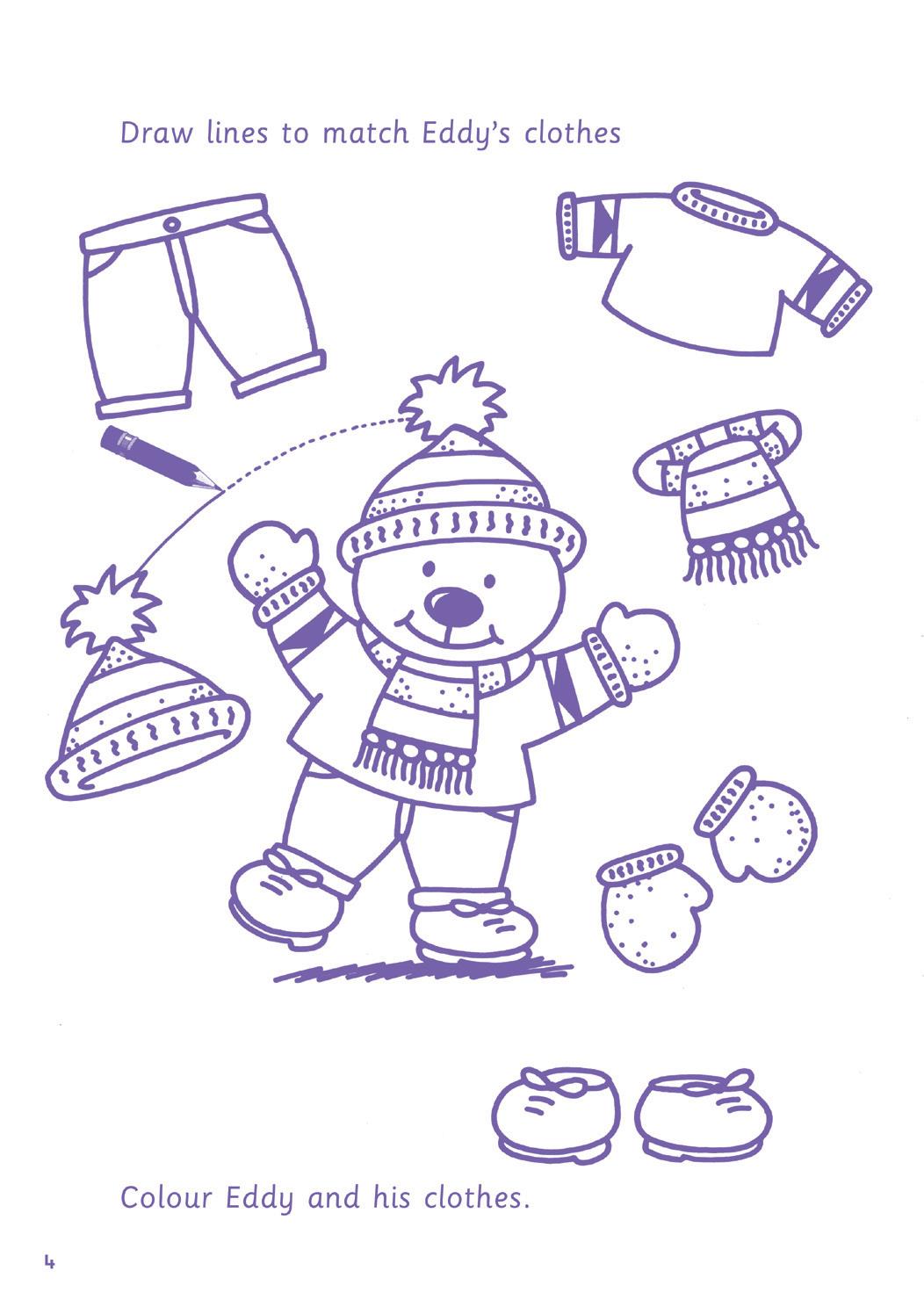

Nursery Activity Book 1 978 07217 1800 2
Nursery Activity Book 2 978 07217 1801 9
Patterning activities boost
control and hand–eye coordination.
Nursery Activity Book 3 978 07217 1802 6
Nursery Writing Book 1 978 07217 1803 3
Nursery Writing Book 2 978 07217 1804 0
Nursery Writing Book 3 978 07217 1805 7
Nursery Writing
Kathryn
LinakerNursery Writing is a series of graded activity books that use the familiar character of Eddy the teddy to help young children develop good motor control and learn the correct formation of letters The books also support early literacy skills by encouraging children to link letters and sounds, and write simple words



Nursery Numbers Book 1 978 07217 1806 4

Nursery Numbers Book 2 978 07217 1807 1
Nursery Numbers Book 3 978 07217 1808 8
Nursery Numbers

Sally Johnson
Nursery Numbers is a series of graded activity books that reinforce mathematical language and early number skills, including matching, counting, adding and subtracting The books cover concepts such as money, shapes and measures, and are brought to life by the engaging character of Scamp the dog

My Letters and Sounds
My Letters and Sounds SSP
Schofield & Sims My Letters and Sounds is a brand-new, DfE-validated systematic synthetic phonics (SSP) programme built around 110 stunning, fully decodable readers together with a wealth of teaching guidance and resources The scheme has been carefully developed to provide schools that want to use the Letters and Sounds framework with an up-to-date and comprehensive set of resources that meet the Department for Education’s (DfE) revised core criteria for an effective SSP programme
Teacher’s Handbooks
My Letters and Sounds Teacher’s Handbooks provide you with everything needed to deliver high-quality phonics instruction Two separate books for Reception and Year 1 include:


• detailed teaching guidance



• carefully sequenced lesson plans
• flexible, child-friendly resources and activities
• straightforward assessment and record-keeping
Phonics Practice Pupil Books
Eight My Letters and Sounds Phonics Practice Pupil Books can be used to help children practise their phonics knowledge at school or at home The write-in workbooks include:


• targeted practice of each new learning point
• integrated revision of previous learning
• enjoyable, age-appropriate activities
• a helpful glossary of key phonics terms
Fully decodable Phonics Readers
110 My Letters and Sounds Phonics Readers have been carefully graded to match the My Letters and Sounds progression The fully decodable stories have been written by a team of teachers and phonics experts to create engaging and stimulating story texts that young children will love to read Each reader includes:
• new phonics learning introduced in small chunks
• child-friendly stories written in natural English
• stunning and varied illustrations
• tips for adults reading with children

Phonics e-reader library
The e-reader library features digital versions of every Phonics Reader from the programme These electronic books can be displayed on whiteboards, computer screens or tablets The e-readers can be used for:
• modelling reading at the front of the class or reading as a whole group
• one-to-one practice sessions or with small groups of up to six children who are at the same level in their phonics knowledge
• reading practice at home and in the event of remote learning
Digital resources
My Letters and Sounds is supported by a vast range of photocopiable, digital and audio resources and assessment tools to ensure that learning is embedded in your school



The phonics support includes:
• friezes, mnemonics and word cards for phonics practice
• audio resources that include sound discrimination and enunciation guides
• ongoing assessments embedded into daily lesson plans
• Weekly Resource Packs include larger versions of the photocopiable resources needed for each week’s lessons in a handy format for printing or displaying on a whiteboard
Classroom Kits
The My Letters and Sounds Classroom Kits provide over 1,000 durable, physical, colour versions of the core teaching and learning resources that are used frequently and repeatedly in lessons Resources are split across two Kits for Reception and Year 1, with each set contained within a handy bag for storage The Classroom Kits include:
• classroom friezes
• sound mats
• mnemonic flashcards




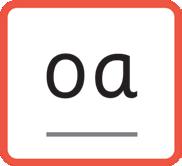

• grapheme cards and words cards for each phase
• letter formation poster
• wipe-clean phoneme frames

• Tog the Robot posting box
Phonics CPD training
The My Letters and Sounds training programme offers high-quality and affordable sessions for schools that need help implementing the programme, upskilling staff and supporting the effective delivery of the programme Features include:
• training that is always delivered live to allow questions and interaction
• various packages from 1 5-hours to a full 6-hour day
• sessions that are delivered online or in-person
Approved Systematic Synthetic Phonics Programme
My Letters and Sounds was submitted to the DfE’s Validation Panel in 2022 and was judged to meet all the most recent DfE criteria for an effective SSP teaching programme
While there is no statutory requirement for schools to choose one of the validated SSP programmes, the DfE strongly recommends that schools consider using an approved programme that enables their teachers to deliver systematic, synthetic phonics instruction throughout Reception and Year 1
Step-by-step instructions guide you through key teaching processes.
My Letters and Sounds Teacher’s Handbooks
Carol MatchettThe My Letters and Sounds Teacher’s Handbooks include everything you need to teach systematic synthetic phonics with confidence Based on a more robust and fully resourced version of the well-known Letters and Sounds progression, the handbooks provide a high level of support, both for teachers that are new to phonics teaching and for more experienced practitioners looking for planning that matches the latest best practice




There are separate handbooks for Reception and Year 1 Each one follows a simple structure, with content divided into teaching guidance (including advice on assessment), lesson plans and photocopiable resources, with additional resources available to download In addition, an extended introduction provides a helpful overview of the programme, which is split into five phases, and an explanation of the separate skills involved in phonics instruction
The Notes include strategies to use if some children struggle to grasp the new concepts.
Banks of activities are provided to facilitate regular practice of each phonics skill. These activities are also used in the weekly Lesson plans
Teaching guidance
The teaching guidance provides essential information about teaching phonics It summarises the knowledge and skills that are introduced or developed at each phase, and provides detailed advice on how to teach them effectively

Lesson plans
My Letters and Sounds provides a lesson plan for every day of your phonics teaching The daily plans, which follow a consistent teaching sequence – ‘Revisit and review, Teach, Practise, Apply, Assess’ – are designed to take around twenty minutes (extending to half an hour as the children move through the programme) The materials required are all either included in the handbook or available to download

The activities are engaging, multi-sensory and deliberately limited in number: this promotes an efficient pace of delivery, as they become familiar to both teacher and pupils
The resources needed for the week are given in order of use. The relevant Phonics Practice Pupil Book and Phonics Reader(s) are also listed.
Teaching is focused, with clear weekly and daily objectives.

References to relevant sections of the Teaching guidance allow teachers to easily access more detailed instructions and support for each lesson.
The digital Resource Packs contain all the handbook resources you need to teach a week of lesson plans, in order, making preparing for lessons quick and easy.

Teaching resources
The My Letters and Sounds Teacher’s Handbooks provide a huge range of photocopiable resources to support your phonics teaching Most resources are used in one or more of the activities in the lesson plans and teaching guidance, but they can also be used flexibly for extra reinforcement, according to your pupils’ needs








An extensive range of photocopiable resources, including word cards and sentences for matching, is provided in the Teacher’s Handbooks
Downloadable digital resources
Larger-format versions of these resources are also available as downloads from the Schofield & Sims website These can be printed or used digitally both in the classroom and at home

Pirate Pete’s parrot spits pips from his perch. Pirate Pete’s parrot goes p-p-p!
Each new GPC is taught using a child-friendly mnemonic and alliterative sentence. Frieze displays, sound mats and audio files help to consolidate this new learning.
Assessment and further guidance
Effective assessment of children’s learning is essential for monitoring progress and informing future planning It also helps to identify any difficulties at an early stage so that they can be tackled immediately My Letters and Sounds helps you to track your children’s understanding over the course of each phase
• Daily formative assessment is made manageable using ‘snapshot’ assessments of a different group of children during each phonics teaching session
• Advice on summative assessment is also given at the end of each phase, helping you to choose appropriate next steps
In addition, optional Assessment checks enable you to assess a particular aspect of a child’s phonics knowledge, such as recognition and recall of graphemes, or spelling of tricky words The summative assessment guidance in the Teacher’s Handbooks suggests when to use these checks with the whole class, but they can also be used with individual children as required

Downloadable Assessment checks are linked to the end-of-phase assessment statements in the Teacher’s Handbook
A Daily assessment schedule helps you to divide your class into groups and focus on certain phonics skills each day.




At each phase, there are separate assessments to evaluate children’s developing phonics skills. Each Assessment check includes clear instructions and a helpful analysis sheet.
My Letters and Sounds Reception Teacher’s Handbook 978 07217 1660 2
My Letters and Sounds Year 1 Teacher’s Handbook 978 07217 1661 9
My Letters and Sounds Phonics Practice Pupil Books


 Carol Matchett
Carol Matchett
The My Letters and Sounds Phonics Practice Pupil Books can be used flexibly, at school or at home, to consolidate the work done in the daily phonics teaching session They provide practice in the key phonics skills of grapheme recognition and recall, blending to read and segmenting to spell, and build children’s confidence in reading and writing captions and sentences With a page or double-page spread for every new learning point in My Letters and Sounds, the books provide highly targeted practice and integrated revision of recently learnt GPCs and tricky words
Designed for young learners, the activities are consistent and predictable, and, as the children do not need to complete all the activities in one go, the books are easy to fit into your school timetable The first few sections should be completed with an adult, in order to introduce the children to the activities Once they are familiar with the format, most children should be able to work more independently – although it is important that an adult checks their work Answers for each book are available to download
Each new GPC is introduced in a predictable way to encourage greater independence in the children.
Writing opportunities become increasingly challenging as children move through the programme.
Answers for each Phonics Practice Pupil Book are available to download from the Schofield & Sims website



Regular letter-formation reinforcement activities are provided.
At Phase Five, familiar activities are used to introduce new graphemes, but there are more words to read to reflect the children’s growing stamina.
AGES 4–6
RRP £4.95
My Letters and Sounds Phonics Practice Pupil Book 1 978 07217 1662 6
My Letters and Sounds Phonics Practice Pupil Book 2 978 07217 1663 3

My Letters and Sounds Phonics Practice Pupil Book 3 978 07217 1664 0
My Letters and Sounds Phonics Practice Pupil Book 4 978 07217 1665 7
My Letters and Sounds Phonics Practice Pupil Book 5 978 07217 1666 4
My Letters and Sounds Phonics Practice Pupil Book 6 978 07217 1667 1
My Letters and Sounds Phonics Practice Pupil Book 7 978 07217 1668 8
My Letters and Sounds Phonics Practice Pupil Book 8 978 07217 1669 5
Large font sizes with clear spaces between words.
My Letters and Sounds Phonics Readers
Kasia Reay, Isabel Thomas, Hawys Morgan and Clare Helen Welsh
The My Letters and Sounds Phonics Readers are exciting, fully decodable stories that perfectly match the progression of the My Letters and Sounds SSP programme Designed to be used from the second week of Phase Two, they allow children to apply their phonics skills to reading ‘real’ books from a very early stage
New grapheme-phoneme correspondences (GPCs) and tricky words are generally introduced in the story texts one or two at a time, giving children focused practice of them in the weeks they are initially taught Ongoing revision of previously learnt GPCs and tricky words is carefully built into the story texts so that children review them on a regular basis
A variety of attractive, contemporary illustration styles give the My Letters and Sounds Phonics Readers the look and feel of real, high-quality children’s picture books Written in natural language, with plenty of humour, the story texts focus on themes and experiences that will appeal to young children from a variety of different backgrounds



Vibrant illustrations fully and directly support the story texts.
Simple, repetitive story texts presented in the same position on each page.
By the end of Phase Two, the story texts feature whole sentences with simple punctuation.
Tricky words are highlighted in blue.
Non-fiction stories appear from Phase Three to develop children’s reading-for-information skills.
Text devices such as captions and labels are gradually introduced.

High-quality photography used in some non-fiction books.


Less familiar and some specialised vocabulary is used in later non-fiction texts.
Increased space allocated to text rather than pictures.

Phase Two Pink A Book Band 8 pages
Sam 978 07217 1744 9 s, a, t, p, i, n, m, d

Man and Dog 978 07217 1747 0 a, t, n, m, d, g, o

Pip 978 07217 1685 5 s, a, t, p, i, n, m, d, g, o, c, k

Sit 978 07217 1697 8 s, a, t, p, i, n, m, d
A
Gap


978 07217 1745 6 s, a, t, p, i, n, d, g, o
Tim 978 07217 1694 7 s, a, t, p, i, m, d

Dig It 978 07217 1746 3 s, a, t, p, i, n, d, g, o


Min and Sid 978 07217 1715 9 s, a, t, i, n, m, d, g, o
Pick and Pack


978 07217 1716 6 s, a, t, p, i, n, m, o, c, k, ck
On the Red Rug 978 07217 1719 7 s, a, t, p, i, n, m, d, g, o, c, k, ck, e, u, r
Peck, Peck, Peck 978 07217 1705 0

s, a, t, p, i, n, m, d, g, o, c, ck, e, u, r
In the Net 978 07217 1717 3 s, a, t, p, i, n, m, g, o, k, ck, e

Cam and Kat 978 07217 1680 0 s, a, t, p, i, n, m, d, g, o, c, k


The Kit 978 07217 1718 0 s, a, t, p, i, n, m, d, g, o, c, k, e, u


Phase Two Pink B Book Band 8 pages
Top Hat

978 07217 1699 2

s, a, t, p, i, n, d, g, o, c, ck, e, u, r, h


On the Hill 978 07217 1696 1 s, a, t, i, n, m, d, g, o, e, u, h, b, f, ff, l, ll
The Pet 978 07217 1700 5 s, a, t, p, i, n, m, d, g, o, e, u, r, h, b, f, l, ss
The Big Hug 978 07217 1683 1



s, a, t, p, i, n, m, d, g, o, e, u, r, h, b

Run, Bug, Run 978 07217 1720 3 s, a, t, p, n, m, d, g, o, c, ck, e, u, r, b, l
The Cup 978 07217 1706 7
s, a, t, p, i, n, d, g, o, c, ck, e, u, r, h, b, f, ff, ll
It is Fun 978 07217 1695 4
s, a, t, p, i, n, g, o, ck, e, u, b, f, ff
The Big Pot 978 07217 1721 0 s, a, t, p, i, n, m, d, g, o, c, ck, e, u, r, h, b, f, l, ll, ss
The Mess 978 07217 1723 4 s, a, t, p, i, n, m, d, g, o, k, ck, e, u, r, b, f, ff, l, ss

Go Get Nan 978 07217 1748 7 a, t, p, i, n, m, d, g, o, ck, e, u, r, h, b, f
At the Till 978 07217 1722 7
s, a, t, p, i, n, m, d, g, o, k, ck, e, u, b, f, ll, ss
Phase Three Red Book Band 8 pages

The Jam Man
978 07217 1710 4 j, v
The Jazzman and His Dog 978 07217 1707 4 j, w, x, y, zz, qu



Chip Can Sit!
978 07217 1724 1 w, y, ch, th, ai



The Mix-up 978 07217 1673 2 j, v, w, x
Rush, Rush, Rush!
978 07217 1681 7

w, y, qu, ch, sh, th


I Can See… 978 07217 1675 6 w, zz, qu, ch, sh, th, ng, ai, ee

The Pet Goat 978 07217 1714 2 w, sh, ee, oa


Cubs and Pups 978 07217 1671 8
w, x, th, ng, ai, igh, oa

The Farm 978 07217 1689 3
w, sh, th, ee, igh, oa, oo (long), oo (short), ar


Look Down
978 07217 1702 9 w, ch, sh, th, ee, igh, oa, oo (short), ar, ow

At My Nan and Pop’s 978 07217 1674 9
w, ch, th, ee, oo (long), or, air
A Good Job
978 07217 1709 8

j, v, w, sh, th, ng, ai, ee, igh, oo (long), oo (short), ar, or, ow, er

This Boat 978 07217 1678 7
j, w, th, oa, ar, or



Zak and His Set 978 07217 1686 2 j, w, x, y, z, zz
The King and the Ring 978 07217 1677 0 j, w, zz, sh, ng

The Big Quiz 978 07217 1701 2 w, x, y, z, zz, qu

At the Shop 978 07217 1670 1 j, v, w, x, sh, th, ng
The Web 978 07217 1712 8 w, th, ng, ai, ee

My Coat 978 07217 1676 3 y, ch, th, ng, ee, igh, oa, oo (long)
The Right Gap

978 07217 1704 3 w, y, ch, th, ng, ai, ee, igh
Dads and Mums 978 07217 1711 1 w, ch, th, oo (short)

Boatman Toad 978 07217 1688 6
sh, th, ng, ai, igh, oa, oo (long), oo (short), ar, or

It Will Be… 978 07217 1725 8
w, x, th, ai, ee, oo (short), ur
This Coin 978 07217 1708 1

j, w, x, th, ee, oo (short), ar, or, ow, oi
The Pet-Sitter 978 07217 1727 2

j, ch, ng, oo (long), ear, air, er
In My Town 978 07217 1713 5 v, y, z, sh, ng, oa, oo (long), ar, ow, ear
Sal the Sow
978 07217 1692 3
w, zz, ch, th, oo (long), ar, ow, ear, air, er
At the Zoo 978 07217 1726 5 w, sh, th, ng, ai, ee, igh, oo (long), oo (short), ar, or, ur, ow, ear
Hair
978 07217 1684 8
j, v, w, y, z, ch, sh, th, ng, ai, oo (long), ar, or, ur, ow, oi, ear, air, er
The Right Number
978 07217 1687 9
j, w, z, sh, th, ng, ai, ee, igh, oo (long), or, ow, er
Phase Four Yellow Book Band 12 pages
The Best Dog

978 07217 1690 9 Introducing CVCC words
The Moon Landing
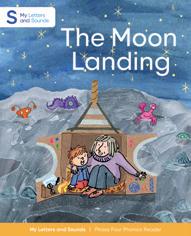
978 07217 1682 4
CVCC words and so, said

The Big Jump 978 07217 1788 3 Practice
The Top Bunk 978 07217 1789 0 CVCC and CCVC words and like
Bumps in the Night



978 07217 1787 6 Practice
The Trip 978 07217 1693 0 CVCC and introducing CCVC words
Thank You, Green Man! 978 07217 1790 6

CVCC and CCVC words and some, come
At the Swimming Pool
978 07217 1672 5 Practice


The Clown 978 07217 1792 0 Practice
What Am I?
978 07217 1691 6 Practice




The Dark Green Boots 978 07217 1698 5

Adjacent consonants and there, were

The Thunderstorm 978 07217 1793 7 Adjacent consonants and out, do


The Tent 978 07217 1729 6 Practice
Stop That Chimp!


978 07217 1791 3 Practice
The Crown 978 07217 1728 9 CVCC and CCVC words and have
The Little One 978 07217 1679 4 Adjacent consonants and little, one
The Winning Street
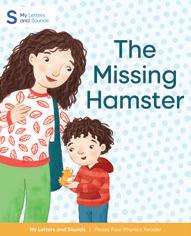
978 07217 1794 4
Adjacent consonants and when, what
The Missing Hamster 978 07217 1795 1 Practice
The Gifts 978 07217 1703 6 Practice

Spook Night! 978 07217 1796 8 Practice
Readers phonics coverage
A handy chart summarising the phonics coverage of each story text is included in the My Letters and Sounds Teacher’s Handbook and can also be downloaded from the Schofield & Sims website
The chart enables teachers to select exactly the right book for each child in any given week of teaching and to see at a glance how the My Letters and Sounds Phonics Readers dovetail with books from other phonics reading schemes It also details the book band for each reader The Reception readers span Pink A, Pink B, Red and Yellow bands, and the Year 1 readers span Blue, Green and orange bands
Waiting for Mum

978 07217 1749 4
Revising Phase Three graphemes

Scout the Stray 978 07217 1753 1 ay, ou, ie
The Car Boot Sale


978 07217 1757 9 a-e, o-e, u-e
The Garden
978 07217 1750 0
Revising Phase Three graphemes
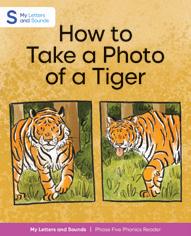
The Compost Heap




978 07217 1754 8 ea, oy, ir
The Light-up Skates

978 07217 1758 6 e-e, wh, ph
Let’s Have Lunch! 978 07217 1751 7
Words with contractions

The New Teacher 978 07217 1755 5 aw, ue, ew


The Twins 978 07217 1752 4



Words ending -s (/s/ and /z/), -est and -ed (/id/ and /d/)
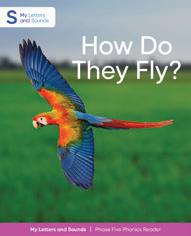
Farmers Are Fantastic! 978 07217 1756 2 oe, au, i-e
Games in the Rain 978 07217 1759 3



Revising phoneme families: /ai/ (ai, ay, a-e); /ee/ (ee, ea, e-e); /igh/ (igh, ie, i-e); /or/ (or, aw, au); /ur/ (ur, ir)
The Nest Box 978 07217 1760 9
Revising phoneme families: /oa/ (oa, oe, o-e); /oo/ and /yoo/ (oo, ue, ew, u-e); /ow/ (ow, ou); /oi/ (oy, oi)
The Sleepover 978 07217 1762 3
Alternative pronunciations: u /yoo/ and /oo/ (short); e /ee/
The Messy Chef 978 07217 1766 1
Alternative pronunciations: a /o/; ch /c/ and /sh/
The Rainbow Unicorn 978 07217 1763 0
How Do They Fly? 978 07217 1770 8
Alternative spellings: /u/ o and o-e; /ee/ ey; /oo/ (long) ui

The Magic Show 978 07217 1767 8

Alternative pronunciations: g /j/; c /s/
The Doll’s House 978 07217 1768 5
Alternative spellings: /v/ ve; /l/ or /ul/ le; /s/ -se and -ce; /z/ -ze and -se
Phase Five Orange Book Band 24 pages
Time Travel with Gran

978 07217 1771 5
Revising phoneme families: /oa/ oa, oe, o-e, ow, o, ou; /igh/ (igh, ie, i-e, i, y)
Beautiful Bees

978 07217 1775 3
Introducing new GPC ure.
Alternative spellings: /ch/ (ture); /ar/ a, al
Gymnastics Club

978 07217 1779 1
Alternative spellings: /ai/ eigh, aigh, ey, ea

Jake’s Amazing Mission
978 07217 1783 8

Revising Phase Five GPCs
When Dinosaurs Walked
978 07217 1772 2

Revising phoneme family /or/ (or, aw, au, aur).
Alternative spellings: /or/ ore, oor, a and al
The Lucky Card
978 07217 1776 0

Spellings of schwa /er/ in the middle and at the end of words
Eat the Rainbow
978 07217 1780 7

Alternative spellings: /sh/ ti(on), ssi, si, and s

The Walkietalkies
978 07217 1773 9
Revising phoneme family /ur/ (ur, ir, er). Alternative spellings: /ur/ or, ear
Grans and Grandads
978 07217 1777 7
Alternative spellings: /n/ kn, gn; /r/ wr; /m/ mb

Treasures Under the Sea

978 07217 1781 4

Introducing new phoneme /zh/ and its spellings su, si


The Lonely Bear

978 07217 1774 6
Alternative spellings: /ear/ eer, ere; /air/ are, ear, ere
Let’s Make Slime!
978 07217 1778 4
Alternative spellings: /s/ st, sc; /i/ y; /or/ augh, our, oar
Furry Heroes
978 07217 1782 1
Words with prefixes and suffixes
Phonics e-reader library
The e-reader library features digital versions of every Phonics Reader from the My Letters and Sounds programme These electronic books are provided in a flexible and secure FlippingBook format that can easily be displayed on digital devices
Books from the e-reader library can be used for modelling reading at the front of class or reading as a whole group They can also be used for one-to-one practice sessions or with small groups of up to six children who are at the same level in their phonics knowledge
The e-readers can be displayed on whiteboards, computer screens or tablets They are organised by phase in each of the coloured tabs and are listed in order of their teaching sequence Click on either the book cover or orange ‘View E-reader’ button to view the e-reader
My Letters and Sounds Reception Classroom Kit



• Full colour Phase Two and Phase Three Mnemonics
• 15 full colour copies of the Phase Two and Phase Three Sound Mats
• Full colour Phase Two and Phase Three Friezes


• Phase Two and Phase Three Grapheme Cards
• Phase Two, Phase Three and Phase Four Word Cards




• Full colour Letter Formation Poster





• Wipe-clean two-, three- and four-box Phoneme Frames





• Full colour flatpack Tog the Robot Posting Box
My Letters and Sounds Year 1 Classroom Kit
• 15 full colour copies of the Phase Five Sound Mat
• Full colour Phase Five Friezes


• Phase Five Grapheme Cards
• Phase Five Term 1, Term 2 and Term 3 Word Cards
Classroom Kits


The My Letters and Sounds Classroom Kits provide over 1,000 durable, physical, colour versions of the core teaching and learning resources that are used frequently and repeatedly in lessons
Sound Mats can be used for regular practice of grapheme recognition and recall, whilst large Friezes can be added to a colourful classroom display to show weekly graphemephoneme correspondences (GPCs) Hundreds of Grapheme Cards and Word Cards are included for use at the front of the class or for the children to post into Tog the Robot Posting Box Wipe-clean Phoneme Frames can be used to demonstrate segmenting with letters Mnemonics are included to introduce new GPCs and demonstrate correct letter formation, which is also supported by a Letter Formation Poster that acts as a clear and helpful reference for the whole class
Phonics Training





The My Letters and Sounds training programme offers high-quality and affordable sessions for schools that need help implementing the programme, upskilling staff and supporting the effective delivery of the programme There are four packages available:
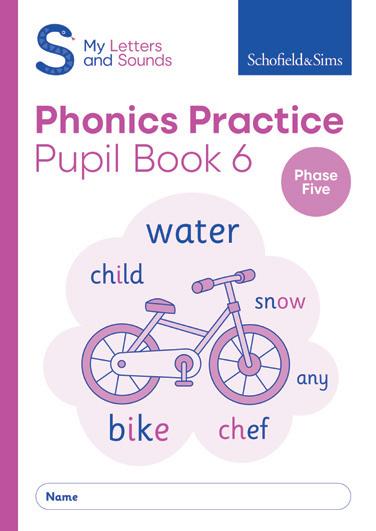
• Phonics Subject Knowledge Masterclass




• Introduction to the My Letters and Sounds Progression
• The My Letters and Sounds Resources and Teaching Sequence

• Implementing My Letters and Sounds in Your School
School training is available online or in-person Online sessions can be delivered on separate days or combined into a single day, although we recommend no more than 3 hours per day In-person training must be a minimum of 3 hours per day and all four sessions can be delivered in 6 hours as a whole day of training, if required
IN-PERSON TRAINING
Half-day (3 hours) £250.00
Full day (6 hours) £450.00 Bespoke training POA
ONLINE TRAINING
Twilight (1.5 hours) £125.00
Half-day (3 hours) £250.00
Full day (6 hours) £450.00
Optional follow-up sessions £100.00 Bespoke training POA
Handwriting Practice 1 focuses on practising correct letter formation, with capital letters introduced halfway through.


Handwriting Practice 2 gives pupils practice in joining letters to form words. By the end of the book, pupils should be able to write fluently on lined paper.
Handwriting Practice
Carol MatchettHandwriting Practice gives pupils practice in forming and joining letters, helping them to develop handwriting that is neat, fluent, legible and fast Fully compatible with any handwriting scheme, the series works methodically through all the letters and joins, with workbook-style pages for children to complete Short and helpful tips provide the key information that children need in order to write correctly, and revision activities consolidate learning Each book ends with a series of longer copying activities – some simulating real-life writing tasks and others featuring songs and poems
Dotted or shaded letters and joins, with arrows indicating direction, are provided when a letter or join is first practised.
Starting dots make clear to the pupil where the pencil should first touch the paper.
‘X-height’, ascender and descender lines are provided throughout the first book, being gradually phased out in the second.
Handwriting Practice 1 978 07217 1203 1
Handwriting Practice 2 978 07217 1204 8
Focus points enable adult helpers to check for common errors and to encourage correct letter formation.
WriteWell Pupil Books
Carol MatchettSchofield & Sims WriteWell is a complete handwriting programme designed to guide children from their first steps in mark-making towards the development of secure, fluent and comfortable joined handwriting that can be adapted for a range of purposes As handwriting is a complex process involving the simultaneous use of cognitive, physical and perceptual skills, and progress often varies greatly within a year group, WriteWell follows a developmental model that splits learning into four discrete Stages
• Stage 1: Shape – teaches children to form lowercase letters, capital letters, numbers and punctuation marks correctly

• Stage 2: Space, size and sitting on the line – helps children to form letters of the correct relative size and to position them correctly on the baseline

• Stage 3: Stringing together and slant – introduces children to the basic diagonal and horizontal joins, as well as more difficult joins and break letters
• Stage 4: Speed and style – encourages children to develop a style of handwriting that is both fast and legible
The WriteWell pupil books provide carefully structured progression and a consistent approach to teaching and learning across all four handwriting Stages There are 11 pupil books in total and the number of pupil books in each Stage varies according to the complexity of the processes involved


Each book contains 15 units, together with a child-friendly introduction and at least one longer writing task Each unit provides a clear handwriting focus, explained in the information panel at the beginning of every spread, followed by targeted activities that enable pupils to practise and apply each new handwriting skill
Children can progress through each Stage at their own pace depending on the time they take to achieve each handwriting milestone The books may also be used in line with the requirements set out for each year group in the National Curriculum as outlined below
Early Years Key Stage 1 Key Stage 2
Reception: Books 1–3 Year 1: Books 4–5 Year 2: Books 6–7 Year 3: Book 8 Year 4: Book 9 Year 5: Book 10 Year 6: Book 11
An information panel at the beginning of each unit explains the handwriting focus.
Practise it activities allow children to practise the focus with less scaffolding.
WriteWell challenges encourage children to take pride in their handwriting skills.

Try it activities enable children to try out the handwriting feature with plenty of support.
Apply it activities encourage children to use each new focus in context.
‘P checks’ focus teachers and pupils on the physical writing process and help to establish good habits.
WriteWell Teacher’s Handbook
 Carol Matchett
Carol Matchett
The WriteWell Teacher’s Handbook provides in-depth support to help you teach the skills needed for children to master handwriting Suitable for use either as a stand-alone resource or alongside the WriteWell Pupil Books, it follows a developmental model based on the National Handwriting Association’s eight ‘S Factors for Success’, while also covering all the National Curriculum handwriting requirements

WriteWell organises learning into four key developmental Stages For each of these Stages there is a detailed set of teacher’s notes, providing:
• an overview of the developmental Stage and corresponding pupil books
• general guidance on teaching the Stage, including ideas for practical activities
• charts describing the correct formation of individual letters and joins, as well as other common difficulties
• photocopiable assessment and intervention materials to help you monitor progress

An Overview box at the start of each Stage chapter summarises the contents of the section.
A simple tab system enables you to quickly navigate to the relevant Stage chapter.
Detailed teaching notes for each pupil book ensure that each focus is understood, attempted, practised and then applied.
As well as providing full teaching notes for each Stage, the WriteWell Teacher’s Handbook also includes a detailed Scope and sequence chart summarising the contents of each of the 11 pupil books and an extended Introduction, offering essential information on using the programme, alongside general guidance on improving the teaching of handwriting in your school Featured topics include supporting left-handers; the ‘P checks’ (posture, pencil grip, paper position and pressure); writing readiness; assessment; and creating a whole-school handwriting policy

Further General resources are provided at the back of the book in the form of a photocopiable Writing mat (left-handed and right-handed versions), Handwriting lines templates and a Handwriting pupil checklist for each Stage There is also a range of free downloadable materials available from the Schofield & Sims website, including a wide variety of animations demonstrating the correct formation of lowercase and capital letters, numbers, punctuation marks and joins Ideal for introducing or recapping the focus of a teaching unit, the animations can be displayed on an electronic whiteboard for the class or accessed independently by pupils using individual devices
Intervention sheets encourage children to analyse letter shapes carefully.


Assessments vary depending on the Stage, but typically involve copying and dictation exercises.
Formation charts provide a summary of the difficulties associated with each letter and join.
Formal assessments help you to decide whether or not a child is ready to move on to the next Stage of the programme.
Spelling Pupil Books
Carol MatchettSchofield & Sims Spelling is a structured spelling programme for Years 1 to 6, fully matched to the National Curriculum Ideal for whole-school use, the series gives pupils intensive practice in using their phonic knowledge to spell words, preparing them for the national tests and encouraging them towards effective spelling for life

The series comprises six pupil books, a teacher’s guide and a teacher’s resource book, as well as a range of free downloads available from the Schofield & Sims website Based on the model ‘teach, practise, apply and assess’, the series builds pupils’ knowledge of spellings by:

• systematically introducing spelling rules, patterns, guidelines and conventions
• exploring word structure and the relationship between words of shared origin
• suggesting strategies for remembering common ‘tricky’ or ‘exception’ words
• providing regular transcription practice through tailored dictation activities
• encouraging pupils to monitor and correct their own spelling
Each Spelling pupil book is divided into six sections containing five main pages that introduce new spelling conventions, followed by a Tricky words or Topic words page that focuses on particular words Books 2 to 6 also feature regular Revision sections that use crossword-style clues, cloze and proofreading activities to elicit spellings that pupils should have mastered
The main pages in the pupil books have a simple and consistent structure comprising three parts:
1 Remember – a description of the spelling pattern, strategy, rule or guideline that is the ‘focus’ for the session and an example
2 Try it – practice in spelling words using the pattern, strategy, rule or guideline
3 Read–cover–write – practice in using the spelling focus in whole sentences
‘I can’ statements at the foot of all but the Tricky words and Topic words pages encourage pupils to take pride in their achievements and apply their learning in their own writing Correct answers at the back of each book enable pupils to mark their own work, laying solid foundations for independent study
Words listed on the Topic words pages support cross-curricular learning.
Free downloads
Further Spelling resources are available as free downloads from the Schofield & Sims website These include:
• National Curriculum correlation charts, showing you exactly where each requirement for spelling is covered in the series
• Supplementary spelling logs, reinforcing the statutory word lists in the curriculum
• Tricky words extra (for Years 1 and 2), listing common words that are exceptions in some accents but not others
• a blank My tricky words sheet, allowing pupils to make tricky words lists of their own
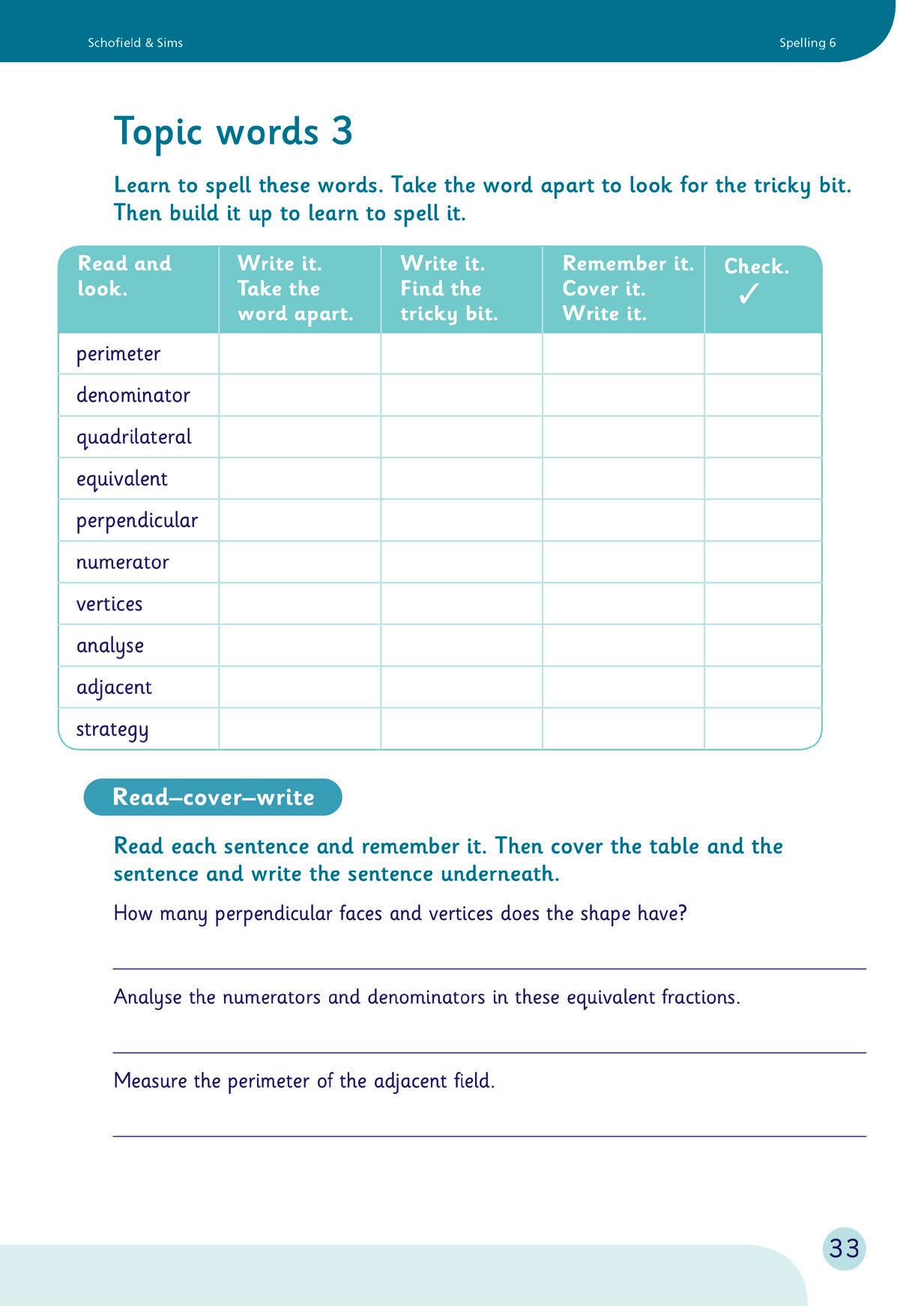
• an Alternative spellings document, giving examples of words that have more than one correct spelling
A simple methodology helps pupils to learn spellings that do not follow expected patterns.
Transcribing words in complete sentences builds vocabulary and consolidates learning.
Spelling Teacher’s Guide
Carol MatchettThe Spelling Teacher’s Guide gives you all the support that you need as you teach pupils to spell The main part of the book comprises detailed Teaching notes – one set for every page of the six pupil books Clearly laid out and in a format that is easy to refer to in the classroom, each set of Teaching notes:
• suggests how best to introduce each learning point or ‘focus’
• clarifies the detail of the focus and exactly what should be covered
• recommends ways of modelling, explaining and exploring the focus

• includes a dictation sentence, specially tailored to the learning point
The book also describes the process of learning to spell and shows how the teaching model may be implemented Guidance is given on issues such as differentiation and spelling in the context of writing, and a Scope and sequence section summarises the content of each pupil book Other topics covered include the spelling of tricky words, ways in which you can support less able learners and the practicalities of assessment and record-keeping

Spelling Teacher’s Resource Book
Carol MatchettThe Spelling Teacher’s Resource Book is an invaluable collection of photocopy masters that support teaching, learning and assessment Full guidelines for use are given in the concise and practical notes that open each of the book’s two parts
Part 1 provides resources to support teaching and learning, including:
• alternative methods for introducing learning points
• activities that explore further the content of a specific pupil book page (for example, Spelling log, Word sort and Word collector photocopy masters)
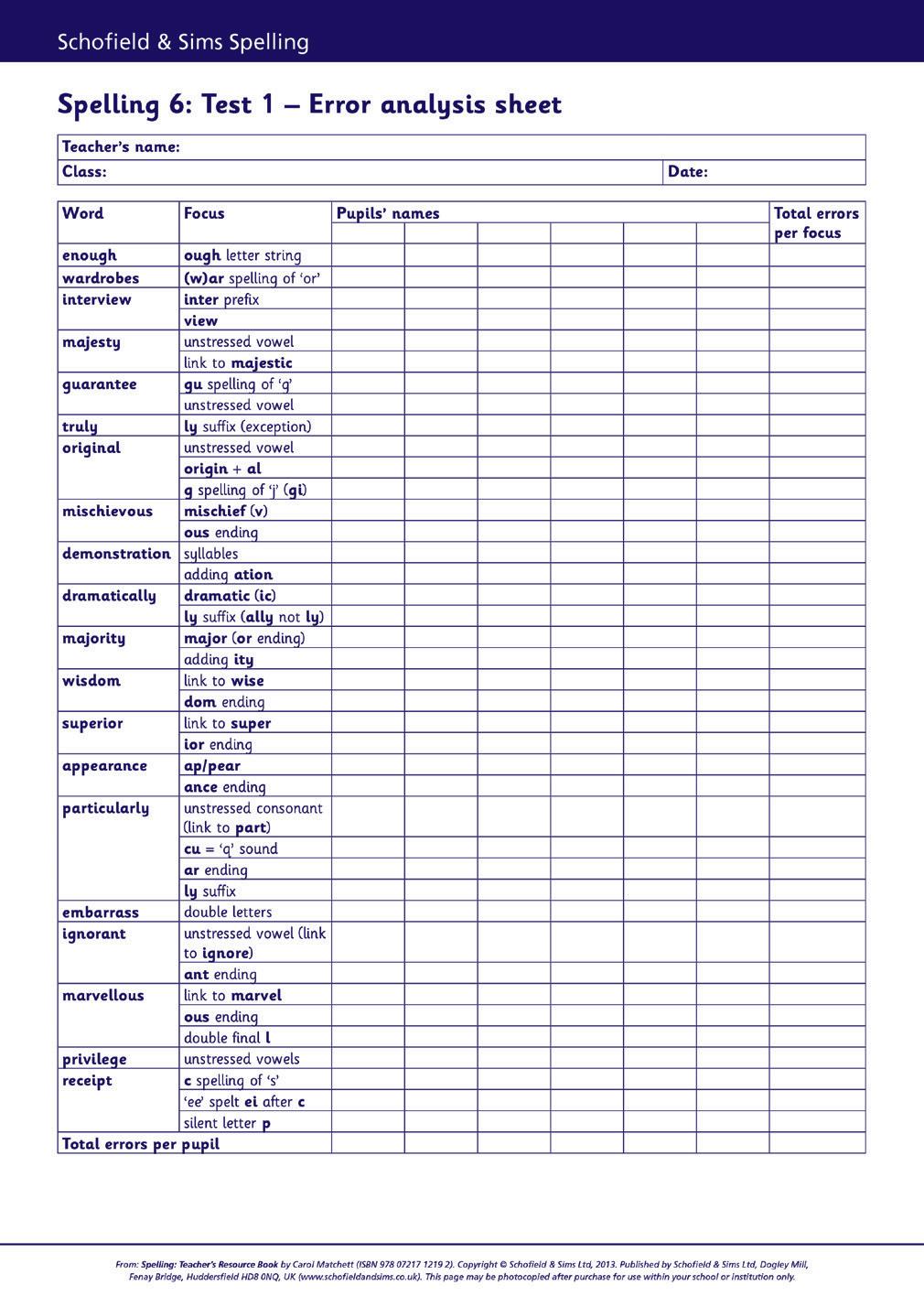
• reminders and prompts, which encourage pupils to apply spelling strategies in their own writing (for example, Target reminder and Words to practise photocopy masters)


Part 2 provides assessment and record-keeping resources, including:
• a bank of dictation tests that assess cumulative learning
• materials for analysing independent writing
Spelling Teacher’s Resource Book 978 07217 1219 2
Grammar and Punctuation Pupil Books
Carol MatchettGrammar and Punctuation is a complete programme for teaching grammar and punctuation while also building on vocabulary, reading and writing skills Through structured lessons, stimulating Focus texts and engaging practice activities, pupils not only learn the terminology and correct usage of grammar and punctuation, but also build up the skills, knowledge and confidence to apply them successfully in their own writing
See pages 34–37 for Schofield & Sims Spelling, a complete spelling programme for use alongside Grammar and Punctuation
Examples are given that refer back to the Focus text
Remember panels provide a child-friendly summary of the key learning point. Key grammatical terms are highlighted in bold and defined in the Glossary at the back of the book.


Comprising six pupil books and six accompanying teacher’s guides, one for each primary school year, this comprehensive scheme supports a mastery approach to the teaching of grammar and punctuation All pupils are encouraged to move at the same pace through the lessons, and a wide range of practice questions, writing tasks, activity ideas and assessments are provided to embed learning and ensure that pupils put their newfound skills into practice Grammar
Pupils write their own sentences using the learning point.
Activities feature a wide range of vocabulary.
Grammar and Punctuation is designed for pupils in Years 1 to 6, with each pupil book meeting the statutory requirements for the corresponding National Curriculum year Books 2 to 6 each provide 30 single-page lessons, while Book 1 features 15 double-page lessons targeted at younger learners Suitable for use either independently or alongside the accompanying teacher’s guides, all the pupil books include:
• Remember panels summarising the key learning point for each lesson
• targeted practice, from short Try it activities that check understanding to more in-depth Sentence practice questions that require pupils to compose their own sentences
• attractive illustrations to keep pupils engaged and inspire creativity

• Revision pages to reinforce learning and identify strengths and weaknesses
• Writing tasks to assess the application of new knowledge in their own writing
• a Progress chart with ‘I can’ statements to encourage pupils to assess their own learning
• a Glossary to support the confident use of grammatical terminology

Attractive illustrations are designed to capture children’s imagination and inspire their
Space is provided for pupils to complete the Writing task in the pupil book, providing a permanent record of achievement.

Key terminology is listed in an introductory panel and defined in the extended Glossary at the back of each book.
Grammar and Punctuation Teacher’s Guides
Carol MatchettGrammar and Punctuation supports the explicit whole-class teaching of grammar and punctuation within the wider teaching of reading, writing and speaking Based on the model ‘teach, practise, apply and assess’, each Grammar and Punctuation Teacher’s Guide provides you with everything that you need to help pupils master the complexities of grammar and punctuation, including:
• practical notes with short Focus texts to demonstrate the learning objective


• reinforcement activities for each lesson, including cross-curricular links
• answers to all the questions in the corresponding pupil book
• an end-of-year test covering all the grammar points in the pupil book
• assessment and record-keeping resources
• a comprehensive Glossary of grammatical terms to support teacher development
A short Focus text at the start of each lesson provides a context for the learning.
Suggestions are given for ways that you can extend the focus for pupils who are ready to delve deeper.
A dictation task shows whether pupils have understood the terminology and key learning objective.
Each set of teaching notes offers detailed guidance on how to use the Focus text to introduce the particular grammar or punctuation point that you are teaching, as well as suggestions for alternative ways of modelling the idea to develop understanding Clear references to the relevant practice questions in the pupil books are provided alongside ideas for applying the concept in speech and independent writing
The teacher’s guides also feature a wide range of assessment and record-keeping materials, including:
• Dictation tasks – short dictation exercises to assess whether children have understood the learning objective of each lesson
• Writing task assessment resources – an Analysis sheet listing relevant criteria against which to assess pupils’ writing, and a Pupil checklist to encourage self-assessment and facilitate teacher feedback
• Final test assessment resources – a photocopiable end-of-year assessment with questions similar in style to the national tests, together with a detailed Mark scheme and Analysis sheet to help you identify individual or class strengths and weaknesses
Answers to all the pupil book activities are provided alongside the teaching notes.
Free downloads available
Free downloads
A selection of free Grammar and Punctuation downloads is available from the Schofield & Sims website
These may be used to further enhance the effectiveness of the programme
The downloads add to the range of print materials supplied in the teacher’s guides They include the following items:
• a Curriculum coverage chart
• an enlarged Focus text for each lesson

• a Dictation assessment sheet
• a Pupil target reminder
• a Learning pathways class chart for each year group
• a Final test analysis class chart for each year group
Detailed annotations offer guidance on what to look out for and how to tackle potential problems.
AGES 5–11
RRP £10.00
Grammar 1 Teacher’s Guide 978 07217 1391 5
Grammar 2 Teacher’s Guide 978 07217 1393 9
Grammar 3 Teacher’s Guide 978 07217 1395 3
Grammar 4 Teacher’s Guide 978 07217 1397 7
Grammar 5 Teacher’s Guide 978 07217 1399 1
Grammar 6 Teacher’s Guide 978 07217 1401 1
A simple key indicates where questions have more than one possible answer.
English Skills Pupil Books
Carol MatchettEnglish Skills provides regular graded practice to develop pupils’ essential literacy skills and prepare them for the Key Stage 2 national tests Key areas are constantly revisited, giving pupils the intensive and rigorous practice that is essential if they are to become fully literate Fully in line with the statutory requirements for the National Curriculum for English, the series comprises seven pupil books, seven answer books and a teacher’s guide
Each English Skills pupil book contains 36 one-page tests made up of the following three parts:
• Warm-up – word puzzles, ‘warm-up’ exercises and revision of earlier learning
• Word work – questions on spelling, word structure and vocabulary

• Sentence work – questions on sentence structure, punctuation and grammar
Additional features include a Glossary of relevant literacy terms and a Progress chart allowing pupils to monitor their own skills as they work through the book Three Writing tasks and three Proofreading tasks are also provided to encourage children to apply what they have learnt in their own writing
English Skills Introductory Book

978 07217 1402 8
English Skills 1
978 07217 1404 2
English Skills 2
978 07217 1406 6
English Skills 3
978 07217 1408 0
English Skills 4
978 07217 1410 3
English Skills 5
978 07217 1412 7
English Skills 6
978 07217 1414 1
The table below indicates which English Skills pupil book may be most suitable for a child based on the National Curriculum expectations for each year group Two Entry tests are also provided in the teacher’s guide and as free downloads to further assist you in selecting the appropriate book for each child
Pupils working below expectations Pupils meeting expectations Pupils exceeding expectations
Year 3 Introductory Book Book 1 Book 2
Year 4 Book 1 Book 2 Book 3
Year 5 Book 3 Book 4 Book 5
Year 6 Book 4 Book 5 Book 6
Separate answer books contain correct answers to all the questions, as well as Focus panels summarising the key learning point of each set of questions, photocopiable Writing task assessment sheets and Completed proofreading tasks
Free downloads
A range of free English Skills downloads are available from the Schofield & Sims website These resources may be used to support pupils in their learning, both in school and at home, and include the following:
• two Entry tests to help you choose the most suitable book for each pupil, together with two Entry test marking keys and a Group record sheet
• an Achievement award certificate for each pupil book
• a National Curriculum chart showing how each book aligns with the English programmes of study
Proofreading tasks feature helpful hints and an extra short writing task to develop children’s creative writing skills.

English Skills Introductory Book Answers 978 07217 1403 5
English Skills 1 Answers 978 07217 1405 9
English Skills 2 Answers 978 07217 1407 3
English Skills 3 Answers 978 07217 1409 7
English Skills 4 Answers 978 07217 1411 0
English Skills 5 Answers 978 07217 1413 4
English Skills 6 Answers 978 07217 1415 8
English Skills Teacher’s Guide
 Carol Matchett
Carol Matchett
The English Skills Teacher’s Guide introduces the series and provides suggestions for how the pupil books may be used It contains the following two sets of resources:


• Assessment resources include two Entry tests to help you select the most appropriate pupil book for each child and seven Diagnostic checks for children who are struggling to meet age-related expectations, along with accompanying marking keys and activity prompts
• General resources, providing a range of photocopiable resources designed to help pupils when they are writing or working through the tests There are photocopiable resources for spelling, grammar, punctuation, vocabulary and writing that can be copied and used as handouts or enlarged and displayed as posters English Skills Teacher’s
Two Entry tests are provided, one for lower Key Stage 2 and one for upper Key Stage 2.
An alphabet strip helps children to locate words in the dictionary.
Picture Dictionary
The Picture Dictionary uses simple word and picture association to develop young children’s language and reading skills

Key features of the Picture Dictionary include:
• colourful illustrations and an infant typeface to help children recognise more than 400 headwords

• an alphabet strip at the top of every double-page spread to assist children in locating words and reinforce their knowledge of the alphabet
• high-frequency words shown in bold throughout
• separate lists of verbs, opposites, colours, days of the week, months of the year and numbers to 20
• a complete photocopiable list of all the words featured in the dictionary
The definition of a word is displayed in the form of a colourful illustration.
High-frequency words are shown in bold type for quick reference.
Picture Dictionary
978 07217 1131 7
First Illustrated Dictionary
The First Illustrated Dictionary uses age-appropriate definitions and pictures to widen children’s vocabulary and improve their reading, writing and spelling skills at Key Stage 1 Supporting the dictionary requirements of the National Curriculum, it includes more than 2,000 headwords and definitions, and more than 500 colour illustrations


Key features of the First Illustrated Dictionary include:
• concise How to use this book instructions
• clear guide words indicating the first and last headwords on each spread
• information on short forms and irregular plurals
• guidance on pronunciation
• an alphabet strip on each page to reinforce knowledge of the alphabet
• separate lists of colours, months of the year, days of the week and numbers
First Illustrated Dictionary 978 07217 1132 4

Comparatives and superlatives are included for some adjectives.
First Dictionary
The First Dictionary helps to widen children’s vocabulary and develop their reading, writing and spelling skills as they transition from Key Stage 1 to Key Stage 2 Supporting the dictionary requirements of the National Curriculum, it includes more than 5,000 headwords, carefully chosen to reflect contemporary usage and interests Key features of the First Dictionary include:
• a special What is a dictionary? introduction for children
• concise How to use this book instructions
• clear guide words indicating the first and last headwords on each spread
• an alphabet strip on each page to reinforce knowledge of the alphabet
• guidance on pronunciation
• separate lists of common words, pronouns, synonyms, antonyms, time words and numbers


• additional lists of topic words on the themes ‘School’, ‘Places’, ‘Travelling’ and ‘Numbers’
The third-person singular, the present participle and the past participle are given as alternative verb forms.
Plurals are provided next to many headwords.
Guidance on pronunciation is given where appropriate.
First Dictionary 978 07217 1141 6

First Thesaurus
The First Thesaurus helps to widen children’s vocabulary and develop their reading, writing and spelling skills as they transition from Key Stage 1 to Key Stage 2 Supporting the dictionary requirements of the National Curriculum, it includes more than 2,000 headwords and 10,000 synonyms to help build children’s word power
Key features of the First Thesaurus include:

• a special What is a thesaurus? introduction for children
• concise How to use this book instructions
• clear guide words indicating the first and last headwords on each spread
• an alphabet strip on each page to reinforce knowledge of the alphabet


• a list of more than 500 antonym pairs
• additional lists of topic words on the themes ‘All about you’, ‘Animals’, ‘Plants’, ‘Food, drink and cooking’, ‘Your home’ and ‘Things to wear’
Synonyms are given for each different meaning.
Guide words help children to find the word they are looking for.
‘I can’ statements encourage children to take pride in their learning.
First Dictionary and Thesaurus Activities
Carol MatchettAlthough written for use with the First Illustrated Dictionary or First Dictionary, and with the First Thesaurus, this versatile activity book may be used with any other dictionary or thesaurus that you have in your classroom Presented as a one-per-child workbook, First Dictionary and Thesaurus Activities will provide you with a permanent record of each child’s work


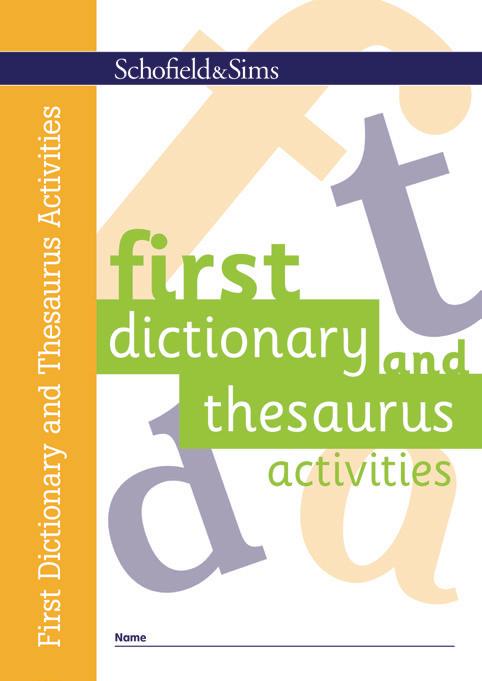
The activities contained within the book:
• clearly demonstrate the value of the dictionary and thesaurus and help children to develop the skills and knowledge that they need for using them
• include clear and attractive illustrations
• are enjoyable and stimulating, enriching children’s language and encouraging them to be more accurate and more adventurous in their choice of words
• may be completed in class or as homework
• include helpful notes for teachers and a list of objectives covered First
‘Origin’ panels at the start of each new section provide information on the history of the shape of the capital letter.
The Complete Primary Dictionary
Michael JanesAimed at pupils in Key Stage 2 and above, The Complete Primary Dictionary features more than 75,000 words, meanings and examples As well as offering precise definitions written in clear and accessible language, it also provides a wealth of additional information to enhance children’s appreciation of the English language, including:

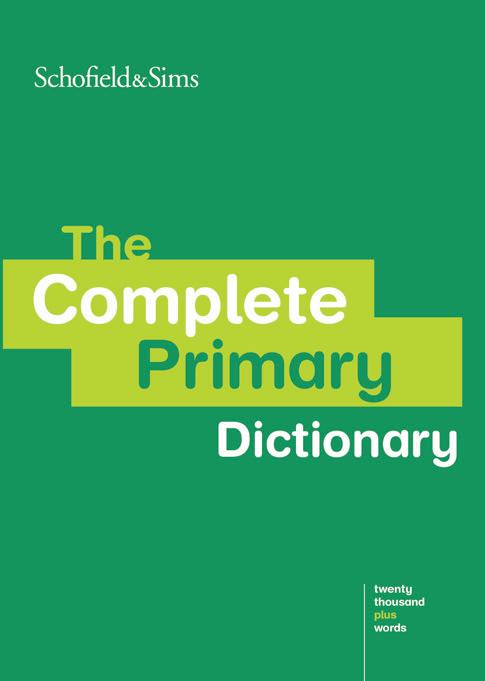
• explanations of letter shape origins and word etymologies
• fascinating facts about history, traditions and other topics
• language extras, such as alternative spellings and grammatical points
• relevant examples of words with the same or opposite meaning
• examples of common similes and idioms
• definitions of older words, including nature words, found in children’s classics
Relevant synonyms and antonyms help to build word power.
A wide range of proper nouns are included to boost children’s general knowledge.
Clear examples are provided to show children how words may be used in their own writing.
Common interjections are included as headwords.
The third-person singular, and present and past participle forms are provided for all verbs.
Important suffixes and prefixes are given as headwords.
Interesting etymologies are frequently highlighted.
Early Comprehension 1
• What happens first/before/next
• Telling a story based on a set of pictures
• Reading captions
• Identifying how a story ends
Early Comprehension 2
• Matching pictures with captions
• Reading simple instructions
• Riddles
• Speech bubbles

Early Comprehension 3
• Advertisements
• Invitations
• Notices
• Newspaper articles
• Book covers
• Reading comprehension based on fiction and non-fiction texts
Early Comprehension
Anne Forster and Paul MartinEarly Comprehension is a series of graded activity books that develop children’s ability to make sense of pictures and text through activities such as story sequencing, reading for meaning and traditional comprehension work The books feature a wide range of genres, including fiction and non-fiction texts, and are ideal for use with pupils who are not yet ready to attempt formal written comprehension

Key skills covered in the series include:
• classifying
• drawing conclusions
• making predictions
• making inferences
• following instructions
• identifying facts and details
• sequencing
• matching pictures with captions
• linking cause and effect
• identifying similarities and differences
Simple matching, drawing, colouring and sequencing activities develop children’s early comprehension skills.
RRP £4.95
Early Comprehension 1
978 07217 0917 8
Early Comprehension 2 978 07217 0918 5
Early Comprehension 3 978 07217 0950 5
All of the texts are available to download in a printable format.
Complete Comprehension
Jo Gray, Laura Lodge and Jane Sowerby Schofield & Sims Complete Comprehension is the essential companion for teaching reading comprehension in your school Written by a team of expert authors, it provides you with everything you need to develop the individual comprehension skills identified in the National Curriculum, alongside the broader vocabulary and background knowledge required for effective reading comprehension
Each Complete Comprehension unit focuses on developing a single comprehension skill through in-depth modelling and practice of test-style questions A Skills guide at the beginning of each Complete Comprehension book explains each skill in detail and offers helpful guidance on how to model the skills for your class

As well as developing the individual skills required for successful reading comprehension, such as inference and retrieval, the resource also aims to make reading a positive experience for all pupils by providing extensive opportunities for classroom discussion and wider exploration of the subject or theme
Each skill has its own icon that children will quickly learn to recognise.


Answers to all the questions are provided in the teaching notes for each unit.
Attractive illustrations help to stimulate pupils’ interest in the text.
All the pupil materials are fully photocopiable allowing for year-on-year use.
There are six Complete Comprehension books in total – one for each primary school year group – comprising between 18 and 21 units Each unit includes a photocopiable passage with accompanying pupil questions, detailed teaching notes and marking support All the units follow a consistent structure based on the following five steps:

1 Get ready – prepares children to engage with the text by introducing them to key vocabulary and activating background knowledge
2 First steps – uses straightforward questions to check children’s initial understanding
3 Explore – helps children to appreciate the literary features and broader themes of the passage
4 Skills focus – builds pupils’ confidence through intensive modelling and independent practice of skill-specific questions
5 Where next? – encourages children to discover more through activities and further reading about the topic
Great care has been taken to source engaging text passages, covering a range of subjects, experiences and genres in order to spark pupils’ interests and promote a love of reading

The Language toolkit includes vocabulary activities and a summary of relevant phonics knowledge.
Modelling questions help you to demonstrate the target skill in context.
Mix it up! activities allow pupils to practise a variety of skills in combination.
Complete Comprehension 1
978 07217 1645 9
Complete Comprehension 2 978 07217 1646 6
Complete Comprehension 3 978 07217 1647 3
Complete Comprehension 4 978 07217 1648 0
Complete Comprehension 5 978 07217 1649 7
Complete Comprehension 6 978 07217 1650 3
First Comprehension Pupil Books

 Celia Warren
Celia Warren
First Comprehension provides an early introduction to written comprehension, developing children’s enthusiasm for reading and their ability to interpret texts First Comprehension 1 is aimed at children in Year 2 who are attempting written comprehension for the first time, while First Comprehension 2 is for children in Years 2 and 3 who are gaining confidence in written comprehension
Each book features 18 texts, carefully chosen to provide a reading level that is appropriate to the likely age of the reader and to reflect the variety of forms and genres recommended by the National Curriculum The exercises that follow each extract are presented in two parts that may be answered in one sitting or separately, and cover a broad range of question types, including direct questions, inferential questions and evaluative questions
First Comprehension 1 978 07217 1220 8
First Comprehension 2 978 07217 1221 5
First Comprehension Teacher’s Guide
Celia WarrenThe First Comprehension Teacher’s Guide provides a wealth of supporting information and resources, enabling you to use First Comprehension to its full potential, including:
• advice on how to introduce children to the skills required for written comprehension
• a description of the various question types covered and the different ways in which they are presented
• full Teaching notes for every text, including an introduction and answers
• suggestions for Further activities, including the chance to perform playscripts and learn poetry by heart
• a photocopiable Group record sheet for each pupil book, allowing you to monitor progress



• cross-curricular content tables that help you to link work with topics in other areas of study
First Comprehension Teacher’s Guide 978 07217 1222 2
KS2 Comprehension Pupil Books
Celia WarrenKS2 Comprehension provides a unique collection of stimulating texts that appeal strongly to both boys and girls, together with questions that build and stretch comprehension skills and widen vocabulary Each pupil book is designed for one of the four year groups in Key Stage 2 – starting with Book 1, which is for pupils in Year 3, and working up to Book 4 for pupils in Year 6



Providing more than 72 texts in total, each with questions on the facing page, the series encourages children both to pay close attention to literal meaning and to make inferences and deductions Pupils are also given intensive practice in observing how different kinds of writing are structured and in identifying literary devices and their effects
KS2 Comprehension 1 978 07217 1154 6
KS2 Comprehension 2 978 07217 1155 3
KS2 Comprehension 3 978 07217 1156 0
KS2 Comprehension 4 978 07217 1157 7
Answers include guidance on what to expect where there is a free answer.
KS2 Comprehension Teacher’s Guide
Celia WarrenThe KS2 Comprehension Teacher’s Guide provides you with everything you need to use KS2 Comprehension to its full potential, including:
• a selection of texts that reflect the range of genres required by the National Curriculum
• a variety of question types, including direct, inferential and evaluative questions
• full Teaching notes for every text, including an introduction and answers
• Further activities, including opportunities to perform poems and playscripts
• a photocopiable Group record sheet for each pupil book, allowing you to monitor progress



• reference charts, including National Curriculum objectives charts, Genre charts, Theme charts and Cross-curricular contents charts
A summary panel provides key details including the genre, source and author of the text.
Speaking and listening activities provide a focus for class discussion, drama and group performances.
Theme and Genre charts aid comparisons between the texts.
KS2 Comprehension Teacher’s Guide 978 07217 1158 4
A Time to Speak and a Time to Listen includes work by the following poets:
John Agard, W H Auden, Matsuo Bash¯o, Hilaire Belloc, Laurence Binyon, William Blake, Alison Brackenbury, Charles Causley, G K Chesterton, Stanley Cook, Wendy Cope, W H Davies, Walter de la Mare, John Donne, Eric Finney, John Foster, Thomas Hardy, Ted Hughes, Edward Lear, Wes Magee, John Masefield, Roger McGough, Ogden Nash, Gervase Phinn, Christina Rossetti, William Shakespeare, Percy Bysshe Shelley, James Stephens, Robert Louis Stevenson, Edward Thomas, William Wordsworth.
A Time to Speak and a Time to Listen
Edited by Celia Warren, Foreword by Wendy CopeAn illustrated poetry anthology for Key Stage 2 and above, structured around the verses beginning, ‘There is a time for everything, and a season for every activity under heaven’ Written by more than 70 poets, the poems reflect with thoughtfulness, candour and, where appropriate, humour on the 28 contrasting themes to which these famous verses refer Poems by well-known modern poets are interspersed with older classics, and eight poems by contemporary writers, including Roger Stevens, Jan Dean and Nick Toczek, are published here for the first time
The 100 poems in this collection:
• give pupils an unforgettable introduction to the richness and variety of poetry
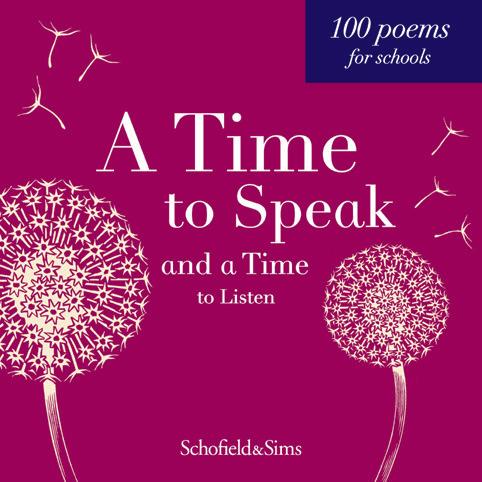
• provide ideal opportunities for speaking and listening, especially if used with the accompanying teacher’s guide (see opposite)
• are perfect for reading aloud, learning by heart and performing
• improve pupils’ fluency as readers and develop their vocabulary
• encourage emotional literacy

Attractive illustrations reflect the mood of the poem.
Themes are clearly indicated at the side of each page.
Teaching notes feature practical advice on how to read the poem aloud.

A Time to Speak and a Time to Listen Teacher’s Guide
Celia WarrenThe A Time to Speak and a Time to Listen Teacher’s Guide supports you as you help pupils to explore and appreciate the poems in the A Time to Speak and a Time to Listen anthology This treasure trove of a resource provides:

• concise teaching notes with everything you need for presenting each poem to your class
• guidance on reading aloud for impact, reading for meaning and choosing poems to learn by heart
• speaking and listening activities with detailed ideas for discussing and performing each poem
• explorations of recurring themes and styles, giving you an overview of the anthology as a whole and helping your pupils to consider personal preferences
• flexible plans for school assemblies on 12 inspiring topics, each providing the focal point for a stimulating assembly that draws upon the anthology
The introduction includes a brief background to the poem and its context.
Icons indicate the emphasis of each lesson plan, for example, speaking, listening and interacting.
Extra extension activities provide opportunities for further study, investigation and written response.
Mental Maths
Anne Forster and Paul MartinMental Maths develops children’s ability to understand number problems and use their knowledge to resolve these problems confidently and logically Clear, carefully structured exercises build children’s mathematical knowledge and mental agility, while a wide range of vocabulary introduces them to the variety of ways in which questions can be asked
Mental Maths 1 978 07217 0962 8
Mental Maths 2 978 07217 0963 5
Number Book
Andrew Parker and Jane Stamford
Number Book is a series of graded activity books designed to help children learn basic calculation skills Aimed at pupils in Key Stage 1, the series provides extensive practice in addition, subtraction, multiplication and division, eventually working with numbers up to 100 Books 4 and 5 feature vertical addition and subtraction




Number Book 1 978 07217 0788 4
Number Book 2 978 07217 0789 1
Number Book 3 978 07217 0790 7
Number Book 4 978 07217 0791 4
Number Book 5 978 07217 0792 1
Maths resources | Telling the time

Telling the Time 1 introduces the concepts of o’clock, half past, quarter past and quarter to, as well as teaching about time in a wider sense, including times of day, days of the week, months of the year and seasons.
Telling the Time 2 introduces counting in 5s around the clock and the related ‘minutes past’ and ‘minutes to’ times, while also comparing analogue faces with digital displays.
Telling the Time 3 focuses on understanding different methods of telling the time, including Roman numerals, digital 12-hour clocks, 24-hour clocks and time zones, as well as featuring a range of time problems.
Telling the Time
Christine ShawTelling the Time is a structured series of activity books designed to help children master the complex skill of telling the time Supporting the time requirements in the National Curriculum, the series breaks down the process of telling the time into the smallest possible steps, ensuring that children fully understand the concepts and have plenty of opportunity to practise before moving on
Each new time is introduced using a large clock face, with the hour and minute hands colour-coded in red and blue throughout the series to make identification clear A wide range of time-related concepts are also covered, including different ways of measuring and representing time, time expressions and problems involving time Colourful illustrations and fascinating Did you know? facts provide further interest Answers to all the practice questions are included at the back of the books for easy marking
A child-friendly summary of the key learning point is provided at the top of each page.

Telling the Time 1 978 07217 1418 9
Telling the Time 2 978 07217 1419 6
Telling the Time 3 978 07217 1420 2
Regular Did you know? facts give interesting background information.
Times Tables Tests 1 covers the 2, 3, 4, 5, 8 and 10 times tables.

Times Tables Tests 2 covers the times tables up to and including 13 × 13.
Times Tables Tests
Hilary Koll and Steve Mills
Times Tables Tests provides regular and structured times tables practice, helping children to strengthen their understanding of essential multiplication and division facts, before progressing to apply these facts to solve word problems based on real-life situations To further boost confidence and rapid recall skills, children are encouraged to work against the clock, which will also help them to prepare for timed examinations

Fully in line with National Curriculum requirements, the tests are similar in structure to those in Mental Arithmetic (see pages 68–69), and are suitable for use alongside this series or independently Each book contains 24 tests grouped into two sections, each ending with a Progress test that allows children to see their consistency and speed build over time A separate teacher’s guide contains answers to all tests in the series, as well as guidance on teaching and reinforcing tables facts
Tests mirror the ‘A, B, C’ format of Mental Arithmetic
My Times Tables Book
My Times Tables Book helps to build fluency and confidence in times tables Matching the pace and coverage of the Year 4 Multiplication Tables Check, the book contains 40 sets of times tables questions, each of which is designed to be completed in two-and-a-half minutes
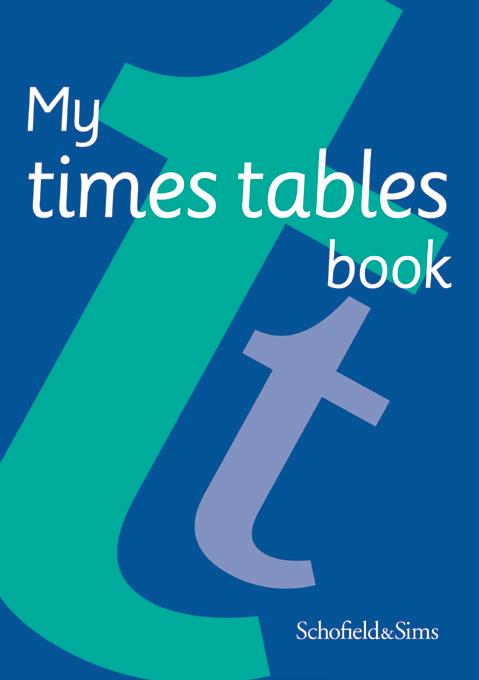
This A5 book also contains:
• useful tips for parents and carers about how to help children to practise times tables at home, written by experienced teacher John Dabell
• a colour-in Progress Chart for tracking children’s progress and celebrating achievement
• space for the teacher to note the child’s specific learning targets in times tables, and for any adult working with the child to note the child’s progress towards meeting them


• a handy Multiplication Square, which children can use to mark their own answers
Once children are confident that they have mastered a particular table, they can tick it off on the Times Tables Checklist on the inside back cover of the book
Space is provided for personalised times tables learning targets.
Learn Your Times Tables 1 covers the 2, 3, 4, 5 and 10 times tables.


Learn Your Times Tables 2 covers the 6, 7, 8, 9, 11 and 12 times tables.
Children are encouraged to use the ‘Look, Cover, Write, Check’ method.
Learn Your Times Tables
Hilary Koll and Steve Mills
Learn Your Times Tables helps children to understand and memorise the key multiplication facts that are required at Key Stages 1 and 2, including the ×11 and ×12 times tables
The series includes:
• What to notice and Hard facts boxes featuring patterns, hints and rhymes to help children remember the first 12 multiples in each table
• consolidation using the ‘Look, Cover, Write, Check’ method
• Cut-out flashcards
• ideas for games and activities
• timed Test yourself questions and an ‘I know my … table’ Summary section to enable children to monitor their own learning
• pull-out answers
Times Tables Practice 1 focuses on the 2, 3, 4, 5 and 10 times tables.

Times Tables Practice 2 focuses on the 6, 7, 8, 9, 11 and 12 times tables.
Times Tables Practice
Ann Montague-Smith
KS1 KS2

Times Tables Practice features a variety of engaging activities to help children practise the times tables relevant to their age group, including the ×11 and ×12 times tables
The books are closely matched to the National Curriculum and place an emphasis on using and understanding the commutative law Both books end with a selection of mixed number problems and What I know pages designed to build children’s confidence and reinforce learning
The Times Tables Practice activities are structured in sections that look separately at different tables Each section encourages children to:
• practise counting
• build the multiplication table
• memorise number facts
• improve their rapid recall skills
• derive related division facts
Times
See pages 68–69 for Mental Arithmetic.
First Mental Arithmetic Pupil Books
Ann Montague-Smith
First Mental Arithmetic provides carefully graded questions that develop children’s basic maths skills and prepare them for all aspects of the Key Stage 1 national tests A downwards extension of Mental Arithmetic, the series comprises six pupil books, six answer books and a teacher’s guide, as well as a range of free downloads available from the Schofield & Sims website


Each First Mental Arithmetic book features two or three sections divided into separate work sessions Each session contains questions arranged in three parts, as follows:
• Part A – questions using pictures or simplified language
• Part B – questions using relevant mathematical vocabulary and symbols
• Part C – word problems or questions that test understanding of mathematical concepts
Throughout the series, additional Check-up tests or Just facts activities assess children’s understanding of particular mathematical areas, while a Language of maths glossary helps to develop their number vocabulary
Free downloads available
The sequence of questions draws pupils’ attention to mathematical patterns, structures and relationships.
AGES 5–7
RRP £4.95
First Mental Arithmetic 1 978 07217 1163 8
First Mental Arithmetic 2
978 07217 1164 5
First Mental Arithmetic 3 978 07217 1165 2
First Mental Arithmetic 4 978 07217 1166 9
First Mental Arithmetic 5 978 07217 1167 6
First Mental Arithmetic 6 978 07217 1168 3
The first three books in the series are designed for pupils in Year 1, while Books 4 to 6 are intended for pupils in Year 2 The Year 2 books are also suitable for use with older children
The layout of the work sessions provided in Books 1 to 3 is slightly different from that provided in Books 4 to 6, to suit the age and attention span of the children Books 1 to 3 are divided into two sections – one for each half-term – that contain at least five work sessions Each session is given a full-page spread and features a variety of colourful illustrations to keep young learners engaged, as well as a useful number line
Books 4 to 6 feature an increased number of questions per session, with each book divided into three sections containing at least 10 one-page work sessions The layout, structure and content of the sessions in Books 4 to 6 is very similar to that of the tests provided in Mental Arithmetic, providing a helpful bridge to the Key Stage 2 series
Separate answer books contain correct answers to all the questions in the corresponding pupil book, including to the Check-up tests, together with a Group record sheet to record and monitor progress
Free downloads
A range of free First Mental Arithmetic and Mental Arithmetic downloads are available from the Schofield & Sims website These resources may be used to support pupils in their learning, both in school and at home, and include the following:
• Entry tests to help you choose the best book for each pupil
• an Achievement award certificate for each pupil book
• a selection of Maths facts sheets

• National Curriculum charts showing how each book aligns with the programmes of study
A Session focus panel summarises the content of each test.
Each answer book is presented as a correctly completed pupil book.
AGES 5–7
RRP £7.95
First Mental Arithmetic 1 Answers 978 07217 1169 0
First Mental Arithmetic 2 Answers 978 07217 1170 6
First Mental Arithmetic 3 Answers 978 07217 1171 3
First Mental Arithmetic 4 Answers 978 07217 1172 0
First Mental Arithmetic 5 Answers 978 07217 1173 7
First Mental Arithmetic 6 Answers 978 07217 1174 4
See pages 66–67 for First Mental Arithmetic.
Mental Arithmetic Pupil Books

J W Adams, R P Beaumont, E Spavin and L Spavin (edited by T R Goddard)
Mental Arithmetic provides rich and varied practice to develop pupils’ essential maths skills and prepare them for all aspects of the Key Stage 2 national tests It may also be used as preparation for the 11+, and with older students for consolidation and recovery
The series comprises seven pupil books, seven answer books and a teacher’s guide, as well as a range of free downloads, including Achievement award certificates, Maths facts sheets and a National Curriculum chart, available from the Schofield & Sims website
Each Mental Arithmetic book is divided into three sections, containing 12 one-page tests – one for each week of the term Each test is presented in a unique three-part format (see pointers below) that features carefully structured arithmetic, number vocabulary and mathematical reasoning questions

Throughout the series, additional 10-minute Progress tests and topic-based Check-up tests highlight any gaps in understanding, while a Language of maths glossary helps to develop pupils’ knowledge of key mathematical vocabulary
Part C features one- and two-step word problems.
Use of language is kept to a minimum in part A.
Part B questions introduce number vocabulary.
Mental Arithmetic
Introductory Book
978 07217 0798 3
Mental Arithmetic 1
978 07217 0799 0
Mental Arithmetic 2
978 07217 0800 3
Mental Arithmetic 3
978 07217 0801 0
Mental Arithmetic 4
978 07217 0802 7
Mental Arithmetic 5
978 07217 0803 4
Mental Arithmetic 6
978 07217 0804 1
Free downloads available
The table below indicates which Mental Arithmetic pupil book may be most suitable for a child based on the National Curriculum expectations for each year group Two Entry tests are also provided in the teacher’s guide and as free downloads, to further assist teachers, parents and tutors in selecting the appropriate book for each child
Pupils working below expectations
Pupils meeting expectations Pupils exceeding expectations
Year 3 Introductory Book Book 1 Book 2
Year 4 Book 1 Book 2 Book 3
Year 5 Book 3 Book 4 Book 5
Year 6 Book 4 Book 5 Book 6
Separate answer books contain correct answers to all the questions in the corresponding pupil book, including to the Check-up tests and Progress tests, as well as a Results chart to record and monitor progress
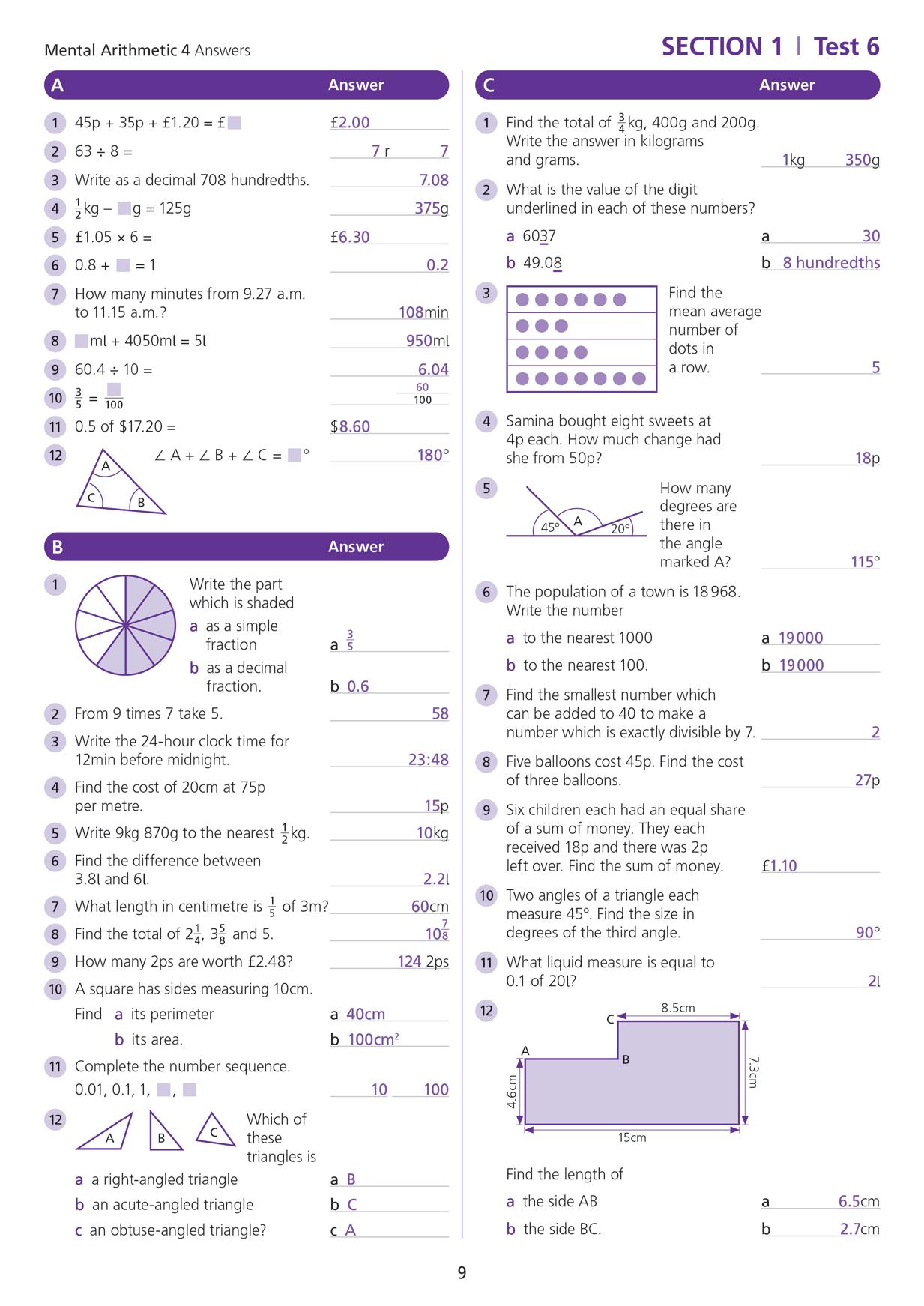
Each answer book is presented as a correctly completed pupil book to speed up marking.
Purpose
Both Mental Arithmetic and First Mental Arithmetic are intended for use alongside existing maths lessons and have been carefully updated to meet the requirements of the National Curriculum for primary mathematics
The books may be used in a variety of different ways, including:
• individual work with pupils who are confident with the maths concepts covered
• paired work allowing pupils who lack confidence in some concepts to discuss the questions and think about possible ways to answer them
• group or whole-class practice, working through a set of questions with a group of pupils after they have answered them
• homework, with parents and carers encouraging children to explain their working
• intervention and Year 7 catch-up
Mental Arithmetic Introductory Book Answers
978 07217 0853 9
Mental Arithmetic 1 Answers 978 07217 0805 8
Mental Arithmetic 2 Answers
978 07217 0806 5
Mental Arithmetic 3 Answers
978 07217 0807 2
Mental Arithmetic 4 Answers
978 07217 0808 9
Mental Arithmetic 5 Answers 978 07217 0809 6
Mental Arithmetic 6 Answers 978 07217 0810 2
First Mental Arithmetic Teacher’s Guide
Ann Montague-SmithThe First Mental Arithmetic Teacher’s Guide provides a detailed introduction to the First Mental Arithmetic series and outlines ways to use the pupil books on a day-to-day basis It contains two sets of resources:

• Assessment resources, including two Entry tests to help you select the most appropriate pupil book for each child and six Diagnostic checks Each Diagnostic check comes complete with a marking key and prompts for corrective activities to help improve pupils’ understanding of the concepts

• General resources, featuring Language of maths glossaries from each of the six pupil books and further photocopiable resources, including number lines, numeral cards, word cards and a hundred square

Mental Arithmetic Teacher’s Guide
Ann Montague-Smith
The Mental Arithmetic Teacher’s Guide provides a detailed introduction to the Mental Arithmetic series and outlines ways to use the pupil books on a day-to-day basis It contains two sets of resources:


• Assessment resources, including two Entry tests to help you select the most appropriate pupil book for each child and seven Diagnostic checks Each Diagnostic check comes complete with a marking key and prompts for corrective activities to help improve pupils’ understanding of the concepts
• General resources, featuring Language of maths glossaries from each of the seven pupil books and further photocopiable resources, including fractions charts, examples of 2-D and 3-D shapes, imperial units of measurement, and counting and multiplication squares

Addition leads pupils through the necessary steps for mastering the column method of addition.
Subtraction leads pupils through the necessary steps for mastering the column method of subtraction.
Multiplication 1 leads pupils through the necessary steps for mastering the column method of short multiplication, and begins to prepare them for long multiplication.

Multiplication 2 leads pupils from short multiplication to long multiplication.
Division 1 leads pupils through the necessary steps for mastering short division.
Division 2 leads pupils from short division to long division.

Written Calculation Pupil Books
Hilary Koll and Steve Mills
Written Calculation provides simple instruction, worked examples and structured practice in the aspects of written calculation that pupils need to master by the end of Key Stage 2 The series comprises six pupil books, six answer books, a teacher’s guide and a teacher’s resource book, as well as a range of free downloads available from the Schofield & Sims website Fully aligned to the National Curriculum and covering all four mathematical operations, it may be used as the basis for a whole-school approach to calculation
Each pupil book uses 18 carefully structured steps to guide the learner towards full mastery of each written method The books also help pupils to develop confidence and fluency in their wider maths learning by practising and embedding place value, number facts and problem-solving skills The importance of estimating and checking answers is also emphasised throughout the series
An explanation of the procedure is given alongside a worked example.
A clear description of the key learning point is provided at the start of each spread.
Addition
978 07217 1266 6
Subtraction
978 07217 1267 3
Multiplication 1
978 07217 1268 0
Multiplication 2
978 07217 1269 7
Division 1
978 07217 1270 3
Division 2
978 07217 1271 0
Each of the 18 steps in the pupil books follows a consistent format, comprising:
• What to do – detailed explanations and a worked example
• Now you try – questions that are similar to those in the worked example
• More practice – questions that are more difficult and provide less support than those in Now you try
• Problem solving – questions that are expressed primarily in words
• Self-evaluation rating – to help identify pupils who may be struggling with the step
Three Check-up tests and a Final test enable you to monitor pupils’ progress throughout the year and quickly convert scores to percentages
Separate answer books contain answers to all the questions in the corresponding pupil book, as well as a useful introduction and a Group record sheet for recording percentage scores
Each step includes problem-solving questions featuring real-life contexts.
Free downloads
Further Written Calculation resources are available as free downloads from the Schofield & Sims website Some of these resources are designed to support pupils’ earliest steps in written calculation, while others provide opportunities for extension work

They include:
• number facts photocopy masters
• reminders and prompts for each method
• ideas for visual and tactile approaches to support conceptual understanding
• estimating and checking strategies
• motivational activities and games
As pupils progress they are encouraged to set out the calculation themselves.
Multiplication 2 Answers 978 07217 1275 8 Division 1 Answers 978 07217 1276 5 Division 2 Answers 978 07217 1277 2
Written Calculation Teacher’s Guide
Hilary Koll and Steve Mills
The Written Calculation Teacher’s Guide provides you with all the support you need to use the Written Calculation pupil books as part of an effective whole-school approach

The main body of the guide comprises detailed planning and teaching notes – one set of notes for each pupil book – that include:
• Learning objectives – fully aligned to the National Curriculum
• Summary of the steps – outlining the content and structure of each pupil book

• Prerequisites – highlighting the existing knowledge needed for each pupil book
• Teaching notes – providing detailed explanations to help you demonstrate each step
The guide also features two photocopiable Assessment tests for each pupil book, each containing 18 questions that align to the 18 steps in each pupil book An additional Mixed calculations test encourages pupils to decide which method to use to solve a variety of word problems Answers are provided to all the questions in the Assessment tests and scores may be recorded on the Group record sheet, located in the back of the answer books
Written Calculation Teacher’s Resource Book
Hilary Koll and Steve Mills
The Written Calculation Teacher’s Resource Book provides additional resources to supplement the material contained in each Written Calculation pupil book It includes a bank of more than 1000 extra questions that reinforce and extend pupils’ knowledge of each method, further developing their conceptual understanding


Questions correspond to the steps in each of the pupil books and may be used for further practice, revision or homework All the resources are photocopiable and answers to all the questions are provided in the back of the book
The resources are organised by pupil book and consist of the following:
• Further practice questions – up to 10 questions per step, conveniently presented to allow additional practice of either one or two steps at a time
• Problem-solving questions – a selection of 12 word problems per book, designed to encourage children to apply written calculation methods to solve a variety of practical problems
Correct mathematical vocabulary is introduced from the start and defined in the Glossary at the back of the book.
Fractions, Decimals and Percentages
Pupil Books
Hilary Koll and Steve Mills
Fractions, Decimals and Percentages is a whole-school programme designed to help pupils develop a deep and secure understanding of these fundamental areas of maths Featuring six pupil books and six teacher’s guides, one for each primary school year, the series explores concepts through a wide range of representations and contexts to ensure that pupils develop procedural fluency and long-term understanding
Fully matched to the National Curriculum, the programme supports a mastery approach to teaching and learning Each lesson focuses on a single learning objective and children are encouraged to move at the same pace through the units Downloadable Go deeper extension resources help to cement pupils’ understanding of the concepts that have been taught, while also developing their problem-solving and reasoning skills


Complex concepts are broken down into manageable and coherent steps.
Questions increase in difficulty and feature engaging contexts suitable for the age and ability of pupils.
Illustrations are relevant and appropriate to the particular mathematical context.
Supports a mastery approach to teaching
Each Fractions, Decimals and Percentages pupil book contains varied activities, suitable for use either in class or at home, that directly correspond to the lessons provided in the supporting teacher’s guide Each unit is set across a double-page spread that begins with a child-friendly summary of the key learning point before progressing to three sets of practice questions, comprising:
• Get started – straightforward practice questions related to the learning objective for the lesson to help pupils gain confidence in the topic
• Now try these – additional number and practical problems to take the topic further with more complex vocabulary and representations
• Challenge – problem-solving questions involving greater challenge and other areas of maths, such as measurement and money
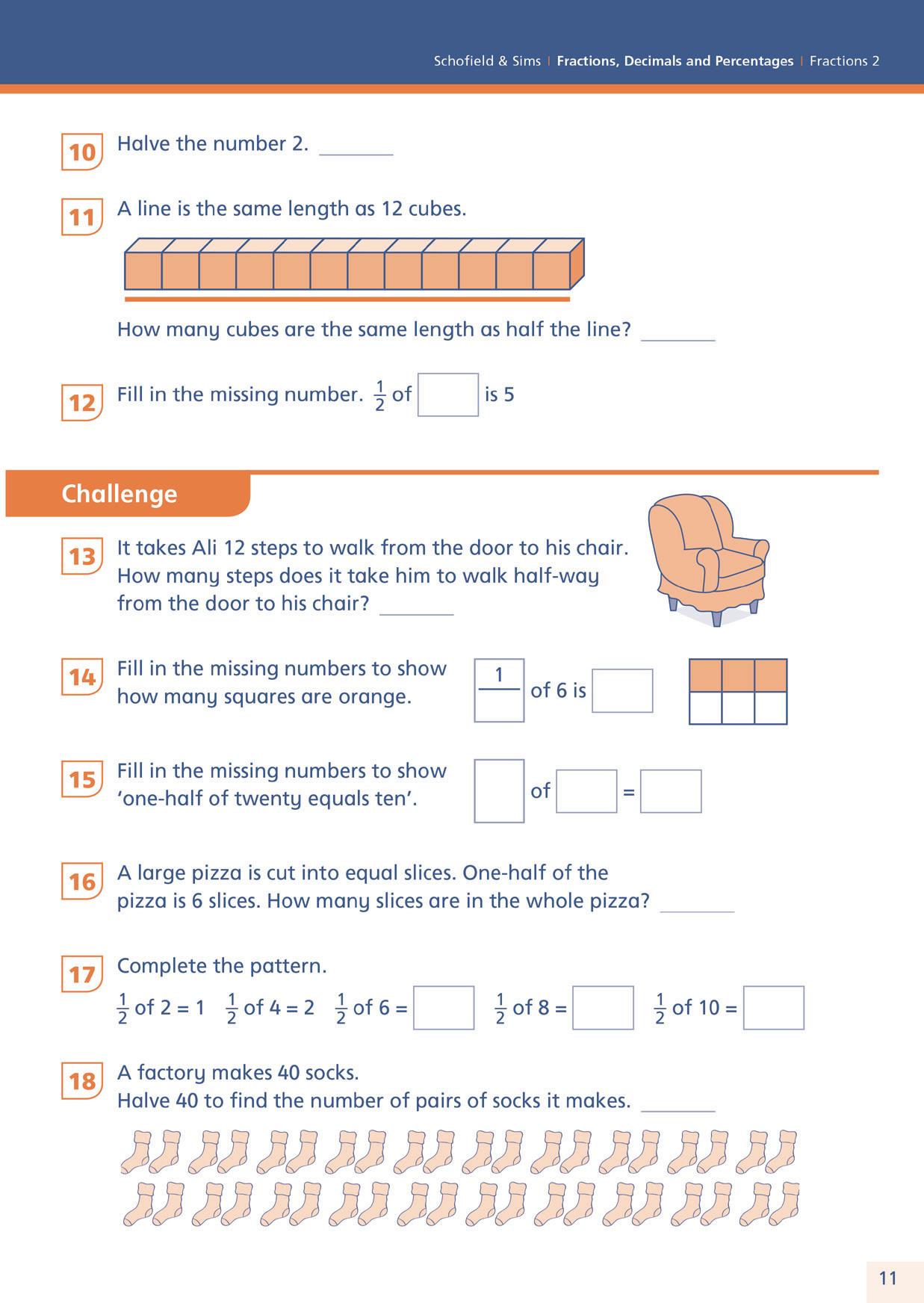
Regular Check-up tests, a Final test and a How did I find it? checklist are also included in each pupil book, together with a concise Glossary to expand pupils’ mathematical vocabulary
Free downloads
A selection of free Fractions, Decimals and Percentages downloads is available from the Schofield & Sims website The downloads add to the range of print materials supplied in the teacher’s guides and include the following items:
• Graphics slides containing visual elements from each teacher’s guide unit provided as Microsoft PowerPoint® presentations
• Go deeper investigations providing additional extension material to develop problem-solving and reasoning skills
• Additional photocopiable resources to support learning and teaching, including a fraction wall, a comparison chart and number lines
Varied tasks require pupils to engage in a wide range of cognitive processes. Pupils are encouraged to apply their learning to a variety of routine and non-routine problems.
Fractions 1 978 07217 1375 5
Fractions 2 978 07217 1377 9
Fractions 3 978 07217 1379 3
Fractions 4 978 07217 1381 6
Fractions 5 978 07217 1383 0
Fractions 6 978 07217 1385 4
Lessons encourage pupils to make connections, reason mathematically and analyse why the concept being taught is true.
Fractions, Decimals and Percentages
Teacher’s Guides
Hilary Koll and Steve Mills
The Fractions, Decimals and Percentages teacher’s guides contain everything you need to teach the National Curriculum requirements for these challenging topics, including detailed lesson plans and answers to all the questions in the corresponding pupil book, as well as a range of assessment and record-keeping resources
Supporting a mastery approach, the lesson plans are aimed at the whole class and include:
• Starting point – clear guidance on how to introduce each learning point with accompanying graphics and scripted questions to guide pupils’ understanding

• Spot the mistake – a short statement featuring a commonly made mistake
• Good to go? – a quick check to assess whether each pupil has understood the lesson
• Pupil book practice – links to the relevant pupil book pages

Key Stage 1 lesson plans include suggestions for practical activities.
Scripted questions are designed to draw out misconceptions.
Potential areas of difficulty in the corresponding pupil book practice are clearly identified.
Additional teaching support is provided in the Year 1 and Year 2 lesson plans in the form of suggestions for practical resources and materials that you can use with pupils to develop each concept There are also links to supporting photocopiable resources provided at the back of the Year 1 and Year 2 teacher’s guides These include cards and posters that can be used to stimulate discussion or cut out and laminated for more permanent classroom use
All the teacher’s guides contain detailed instructions for use, including a National Curriculum coverage chart, prerequisites, problem-solving strategies and assessment advice A complete set of answers for all the units and tests is also provided, together with a photocopiable Pupil progress chart and Final test group record sheet to help you track both individual and class progress

A selection of free downloads is also available from the Schofield & Sims website, including Go deeper investigations, Graphics slides presented as Microsoft PowerPoint® presentations (see right) and a range of additional photocopiable resources


Accompanying Graphics may either be presented on a projector, photocopied as a handout or used as an interactive PowerPoint® presentation.
Fractions 1 Teacher’s Guide 978 07217 1376 2
Fractions 2 Teacher’s Guide 978 07217 1378 6
Fractions 3 Teacher’s Guide 978 07217 1380 9
Fractions 4 Teacher’s Guide 978 07217 1382 3
Fractions 5 Teacher’s Guide 978 07217 1384 7
Fractions 6 Teacher’s Guide 978 07217 1386 1
KS1 Problem Solving 1
• Addition and subtraction to 20
• Counting money and calculating change
• Estimating time
• Weight and capacity
• 2-D shapes
• Days of the week
KS1 Problem Solving 2
• Addition and subtraction to 50
• Counting money and calculating change
• Telling the time
• Length, distance and height
• 3-D shapes and their properties
• The area of flat shapes
• Months of the year
KS1 Problem Solving 3
• Addition and subtraction to 100
• Using a hundred square
• Measuring with a ruler
• Counting money, converting pence to pounds and calculating change
• Reading a calendar
• Right angles
• Odd and even numbers
KS1 Problem Solving
Anne Forster and Paul Martin
KS1 Problem Solving is a series of graded activity books that help children to develop their problem-solving skills by applying their knowledge of maths to a range of real-life situations, such as shopping, measuring and telling the time

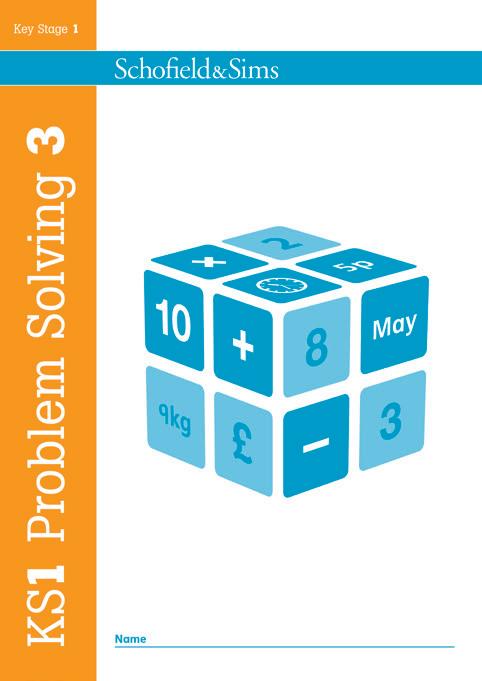
KS1 Problem Solving 1 978 07217 0922 2
KS1 Problem Solving 2 978 07217 0923 9
KS1 Problem Solving 3 978 07217 0924 6
KS2 Problem Solving 1
• Equations
• Multiples of 2, 3, 4, 5, 6 and 10
• Lines of symmetry
• Counting money, recognising coins to £1 and calculating change
• Data handling
• Height, length, distance, capacity and time
KS2 Problem Solving 2
• Thousands
• Area, perimeter and angles of shapes
• Coordinates
• Lines of symmetry
• Odd and even numbers, multiples of 3, 7, 8 and 9
• Fractions
• Probability
KS2 Problem Solving 3
• Rotation of shapes, lines of symmetry and tessellation
• Percentages
• Fractions
• Decimal numbers
• Time problems
• Ratio
KS2 Problem Solving 4
• Reflection, translation and rotation of shapes
• Averages (mode, median and mean)
• Metric–imperial conversions
• Percentages and decimal numbers
• Converting fractions (finding a common denominator)
• Probability
• Using a calculator
KS2 Problem Solving
Anne Forster, Paul Martin and Ann Montague-SmithKS2 Problem Solving is a series of graded activity books that help pupils to improve their mathematical reasoning It encourages them to apply their maths skills to a range of real-life situations, such as reducing a recipe and keeping score in games Each book includes a pull-out set of answers to facilitate marking


KS2 Problem Solving 1 978 07217 0935 2
KS2 Problem Solving 2 978 07217 0936 9
KS2 Problem Solving 3 978 07217 0937 6
KS2 Problem Solving 4 978 07217 1138 6
Primary Practice Maths
Trevor Dixon and Sarah-Anne Fernandes
Primary Practice Maths is the must-have resource for mastery of the primary maths curriculum Ideal for individual study with parents or tutors as well as in the classroom, the series uses a mastery approach to help children develop a deep understanding of key mathematical concepts and methods as they progress from Reception to Year 6
The Primary Practice Maths Books for Years 1 to 6 provide comprehensive coverage of the National Curriculum maths objectives for each year group Written by expert authors, they feature a variety of lively and engaging question types that become steadily more challenging as children work through the books
Spreads are split into ‘Practise’, ‘Extend’ and ‘Apply’ sections, establishing a step-by-step progression through each topic that reinforces the mastery approach to maths Visual representations of mathematical concepts develop children’s understanding, while word problems and puzzles encourage them to apply their knowledge in a range of contexts

Children trace and copy digits to practise forming numbers smoothly.
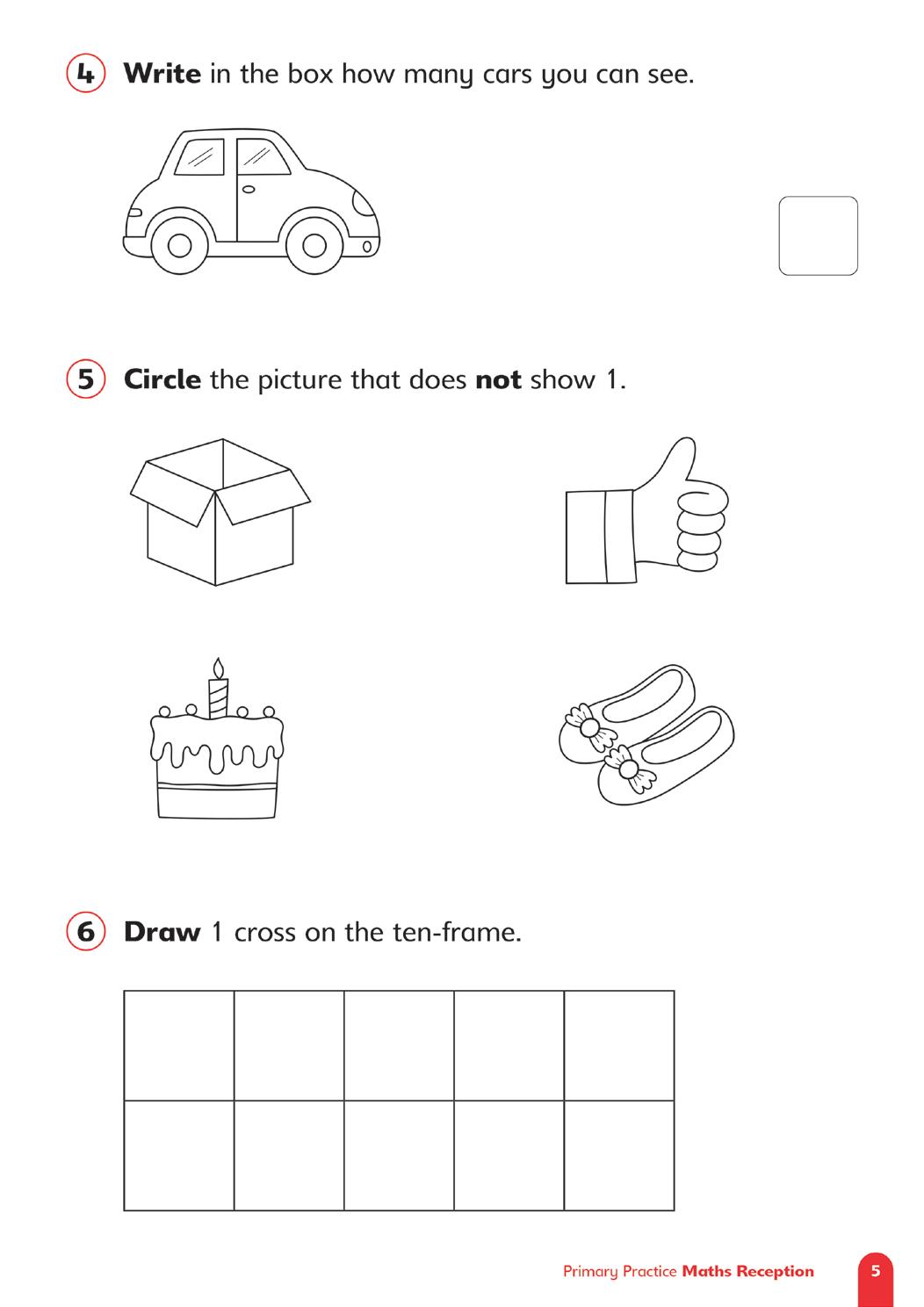
Visual representations are used throughout the series to ensure children understand the logic behind the method.
Primary Practice Maths Book Year 1 978 07217 1731 9
Primary Practice Maths Book Reception 978 07217 1730 2
Primary Practice Maths Book Year 2 978 07217 1732 6

The Maths Practice Reception Book follows the same mastery approach as the Key Stage 1 and 2 books but in an adapted format designed to suit young learners Based on the latest guidance for mathematics teaching in the Early Years Foundation Stage Framework, the Reception book helps develop a strong grounding in number through repeated practice of key skills, including counting, subitising and number bonds to 10 Towards the end of the book, children are introduced to early calculation, shape and measurement topics They also learn how to form every digit correctly in dedicated tracing and copying questions

Additional features of the series include:
• Remember box – each spread begins with a review of essential knowledge and terminology
• Tip box – handy Tip boxes help out with unusual formats or challenging methods

• Final practice – mixed practice questions at the end of each book allow you to monitor progress and identify areas for revision

• Online answers – detailed downloadable answers explain how to answer the questions, as well as outlining possible misconceptions, common errors and alternative methods
The ‘Remember’ box introduces the page focus and any key terminology.
Answers are supported by explanations where appropriate.
Examples are provided for new question types.
Varied activities, including puzzles, engage children and embed learning.
Primary Practice Maths Book Year 3 978 07217 1733 3
Primary Practice Maths Book Year 4 978 07217 1734 0
Primary Practice Maths Book Year 5 978 07217 1735 7
Primary Practice Maths Book Year 6 978 07217 1736 4
For more information visit www.schofieldandsims.co.uk
Primary Practice English
Giles Clare and Emma Scott
Primary Practice English is the must-have series for mastery of the English curriculum Ideal for individual study with parents or tutors as well as in the classroom, the series uses a mastery approach to help children develop a deep understanding of key concepts and skills at each stage as children progress from Reception to Year 6
The Primary Practice English Books for Years 1 to 6 provide comprehensive coverage of the National Curriculum English objectives for each year group Written by expert authors, they feature a variety of lively and engaging question types that become steadily more challenging as children work through the books
Each book uses the ‘Practise’, ‘Extend’ and ‘Apply’ structure for the grammar, punctuation, spelling and vocabulary units, while also featuring up to 10 comprehension texts that draw on a wide range of high-quality fiction, non-fiction and poetry texts An extended writing task provides children with the opportunity to showcase their creative writing skills
Primary Practice English Book Reception 978 07217 1737 1
Primary Practice English Book Year 1 978 07217 1738 8
Primary Practice English Book Year 2


07217 1739

Revision and practice | Yearly practice
The Primary Practice English Reception Book follows the same mastery approach as the Key Stage 1 and 2 books but in an adapted format designed to suit young learners Based on the latest guidance for literacy teaching in the Early Years Foundation Stage Framework, children initially focus on letter formation and phonics reinforcement to establish strong foundations in reading before moving on to word and sentence building Short comprehension and writing tasks are introduced in later units Children also learn how to form the letters of the alphabet correctly in dedicated tracing and copying activities
Additional features of the series include:
• Remember box – each spread begins with a review of essential knowledge and terminology
• Tip box – handy Tip boxes help out with unusual formats or challenging methods
• Final practice – this mixed question practice section allows children to check their progress and identify areas for revision


• Online answers – detailed downloadable answers explain how to answer the questions, as well as outlining possible misconceptions, common errors and alternative methods

Answers are supported by explanations where appropriate. A variety of modern and classic texts introduce children to a wealth of genres and broaden their vocabulary.
Mixed comprehension questions cover a range of reading skills including retrieval and inference.
The ‘In Action’ questions allow children to apply their grammar, punctuation, spelling and vocabulary knowledge to real texts.
Primary Practice English Book Year 3 978 07217 1740 1
Primary Practice English Book Year 4 978 07217 1741 8
Primary Practice English Book Year 5 978 07217 1742 5
Primary Practice English Book Year 6 978 07217 1743 2
For more information visit www.schofieldandsims.co.uk
Tinted boxes provide step-by-step explanations of exam-style questions.

11+ Study and Practice Books
Rebecca Brant, Siân Goodspeed and Charlotte WatsonThe 11+ Study and Practice Books are the essential resource for 11+ success, providing child-friendly explanations for all the key question types that appear in the 11+, together with step-by-step techniques for tackling them, clear worked examples and a wealth of exam-style practice questions Due to the continually changing format of the 11+, rather than trying to replicate the questions in any single provider’s tests, the 11+ Study and Practice Books focus on equipping children with knowledge, skills and strategies that can be used flexibly to tackle questions in a wide range of presentations and variations

Ideal for use in the early stages of a child’s 11+ journey, the 11+ Study and Practice Books are designed to give children a thorough understanding of the key 11+ topics and question types, before they move on to practising them under timed conditions A comprehensive contents page, glossary and index means that the books can also serve as an invaluable study tool for children and parents to refer back to at any point in their 11+ exam preparation
Each page features a clear study focus to help structure learning.
‘Tip’ icons provide extra information about how to tackle a particular type of question.
Checklists at the end of each section provide a useful summary of the key learning points.
There are four 11+ Study and Practice Books in total, one for each of the core 11+ subject areas Coverage of each question type follows the same basic format, consisting of:

• a clear explanation of the question type, including any definitions, vocabulary and rules children need to know
• a step-by-step technique for tackling the question type, presented as a worked example with annotations to show working
• focused practice questions giving children the opportunity to try out the techniques they have just learnt
Practice pages at the end of each section give children the opportunity to apply what they have learnt by answering exam-style questions.

explanations to
11+ Maths Study and Practice Book 978 07217 1459 2
11+ English Study and Practice Book 978 07217 1469 1
11+ Verbal Reasoning Study and Practice Book 978 07217 1427 1
11+ Non-verbal Reasoning Study and Practice Book 978 07217 1428 8
11+ Maths Rapid Tests
Rebecca Brant
The 11+ Maths Rapid Tests feature short, timed tests designed to build speed and fluency in preparation for the 11+ and other school selection tests Written by an experienced tutor, the tests cover a wide range of topics, ensuring that children have the skills and knowledge to succeed in any of the major providers’ tests – including CEM and GL

Each book contains 36 single-page, standard-format tests covering the following topic areas: number and place value; calculation; fractions, decimals and percentages; algebra; measurement; geometry; and statistics The target times for each test range from 12 to 8 minutes, making them ideal for regular independent work sessions
Key features of the series include:
• varying target times for completion and space for recording times and scores
• separate pull-out answers with explanations and Action notes
• a Progress chart for tracking improvement Attractive
11+ Maths Rapid Tests 1 978 07217 1421 9

11+ Maths Rapid Tests 2 978 07217 1422 6
11+ Maths Rapid Tests 3 978 07217 1423 3
11+ Maths Rapid Tests 4 978 07217 1424 0
11+ Maths Rapid Tests 5 978 07217 1425 7 11+ Maths Rapid Tests 6 978 07217 1426 4
The target time is clearly shown at the start of each test. Children are encouraged to record their time, score and whether or not
sales@schofieldandsims.co.uk
11+ English Rapid Tests
Siân Goodspeed
The 11+ English Rapid Tests feature short, timed tests designed to build speed and fluency in preparation for the 11+ and other school selection tests Written by an experienced tutor, the tests cover a wide range of topics, ensuring that children have the skills and knowledge to succeed in any of the major providers’ tests – including CEM and GL
Each book contains 18 double-page tests, with six tests on each of the following topic areas: comprehension; grammar and punctuation; and spelling and vocabulary The tests feature a combination of standard-format and multiple-choice questions to give children practice in answering questions in both formats The target times for each test range from 12 to 8 minutes, making them ideal for regular independent work sessions
Key features of the series include:
• varying target times for completion and space for recording times and scores
• separate pull-out answers with explanations and Action notes


• a Progress chart for tracking improvement
11+ English Rapid Tests 1 978 07217 1429 5

11+ English Rapid Tests 2 978 07217 1430 1
11+ English Rapid Tests 3 978 07217 1431 8
11+ English Rapid Tests 4 978 07217 1432 5
11+ English Rapid Tests 5 978 07217 1433 2
11+ English Rapid Tests 6 978 07217 1434 9
11+ Verbal Reasoning Rapid Tests

Siân Goodspeed
The 11+ Verbal Reasoning Rapid Tests feature short, timed tests designed to build speed and fluency in preparation for the 11+ and other school selection tests Written by an experienced tutor, the tests cover a wide range of topics, ensuring that children have the skills and knowledge to succeed in any of the major providers’ tests – including CEM and GL
Each book contains 36 single-page, standard-format tests covering the following topic areas: word and letter patterns; vocabulary; spelling; number patterns; and problem solving The target time for each test gradually reduces from 15 to 10 minutes, making them ideal for regular independent work sessions
Key features of the series include:
• varying target times for completion and space for recording times and scores

• separate pull-out answers with explanations and Action notes
• a Progress chart for tracking improvement
11+ Non-verbal Reasoning Rapid Tests
 Rebecca Brant
Rebecca Brant
The 11+ Non-verbal Reasoning Rapid Tests feature short, timed tests designed to build speed and fluency in preparation for the 11+ and other school selection tests Written by an experienced tutor, the tests cover a wide range of topics, ensuring that children have the skills and knowledge to succeed in any of the major providers’ tests – including CEM and GL


Each book contains 18 double-page, multiple-choice tests on topics including recognising similarities and differences; identifying reflected and hidden shapes; and completing series The target time for each test ranges from 5 to 8 minutes, making them ideal for regular independent work sessions
Key features of the series include:
• varying target times for completion and space for recording times and scores
• separate pull-out answers with explanations and Action notes
• a Progress chart for tracking improvement
11+ Non-verbal Reasoning Rapid Tests 1 978 07217 1463 9
11+ Non-verbal Reasoning Rapid Tests 2 978 07217 1464 6
11+ Non-verbal Reasoning Rapid Tests 3 978 07217 1465 3
11+ Non-verbal Reasoning Rapid Tests 4 978 07217 1466 0
11+ Non-verbal Reasoning Rapid Tests 5 978 07217 1467 7
11+ Non-verbal Reasoning Rapid Tests 6 978 07217 1468 4
RRP £7.95
11+ Maths Progress Papers 1 978 07217 1456 1
11+ Maths Progress Papers 2 978 07217 1457 8
11+ Maths Progress Papers 3 978 07217 1458 5
11+ English Progress Papers 1 978 07217 1473 8
11+ English Progress Papers 2 978 07217 1474 5
11+ English Progress Papers 3 978 07217 1475 2
11+ Verbal Reasoning Progress Papers 1 978 07217 1470 7
11+ Verbal Reasoning Progress Papers 2 978 07217 1471 4
11+ Verbal Reasoning Progress Papers 3 978 07217 1472 1
11+ Non-verbal Reasoning Progress Papers 1 978 07217 1460 8
11+ Non-verbal Reasoning Progress Papers 2 978 07217 1461 5
11+ Non-verbal Reasoning Progress Papers 3 978 07217 1462 2
11+ Progress Papers
Patrick Berry, Rebecca Brant and Susan Hamlyn
The 11+ Progress Papers provide rigorous and flexible practice for children preparing to sit 11+ tests – including those set by CEM and GL – and other school entrance examinations There are 12 books in total, three for each of the four main 11+ subjects: maths, English, verbal reasoning and non-verbal reasoning


The 11+ Maths and Non-verbal Reasoning Progress Papers both contain 21 assessment papers, while the English and Verbal Reasoning papers contain 18 papers Ideal for revision and consolidation in the final stages of a child’s 11+ preparation, the 11+ Progress Papers provide a wide range of practice questions that gradually increase in difficulty throughout the series, helping you to identify gaps in knowledge and providing a clear measure of progress
Questions are grouped by topic to support targeted practice.
Pupils can choose either to work through the papers systematically for all-round revision and consolidation, or to focus on specific questions from several tests at once for targeted practice of topics that they find particularly challenging Suitable for use at home, in school or with a tutor, the papers are designed to take between 45 and 75 minutes, and pupils may need two or more sessions to complete one paper
Key features of the series include:
• pull-out answers with detailed explanations and marking guidance
• a Progress chart for recording scores and tracking improvement
• a downloadable Topics chart showing topic coverage by paper


• an extra downloadable sample paper for all four subjects
Each English paper includes a set of multiple-choice comprehension questions.

Short writing tasks on a range of themes allow children to practise completing timed creative writing exercises.
Example questions for all the main question types are provided at the start of each non-verbal reasoning book.
The start and end of each paper are clearly labelled.
See pages 94–95 for full-length 1 1+ practice papers.
The total score for each paper is out of 100 for easy conversion to a percentage.
11+ Practice Papers for CEM
Rebecca Brant and Siân GoodspeedThe 11+ Practice Papers for CEM provide realistic test practice for children preparing to sit 11+ exams set by the Centre for Evaluation and Monitoring (CEM) at the University of Durham Carefully designed to replicate the format and content of CEM papers, they help children to develop essential exam techniques while also building confidence and stamina



Ideal for use in the final stages of your child’s 11+ journey, the resource includes two complete CEM-style tests, each consisting of two separate test papers with a time limit of 45 minutes Each complete test features a mixture of verbal reasoning (which, in CEM exams, also encompasses comprehension), numerical reasoning and non-verbal reasoning questions split into timed sections of varying lengths
Separate multiple-choice answer sheets that closely match the format of the answer sheets used in the actual exam are provided for all the papers, allowing children to practise this crucial exam technique Both the papers and answer sheets are published loose in a card wallet, together with guidance notes and full explanations to all the questions
11+ Practice Papers for GL and Other Test Providers

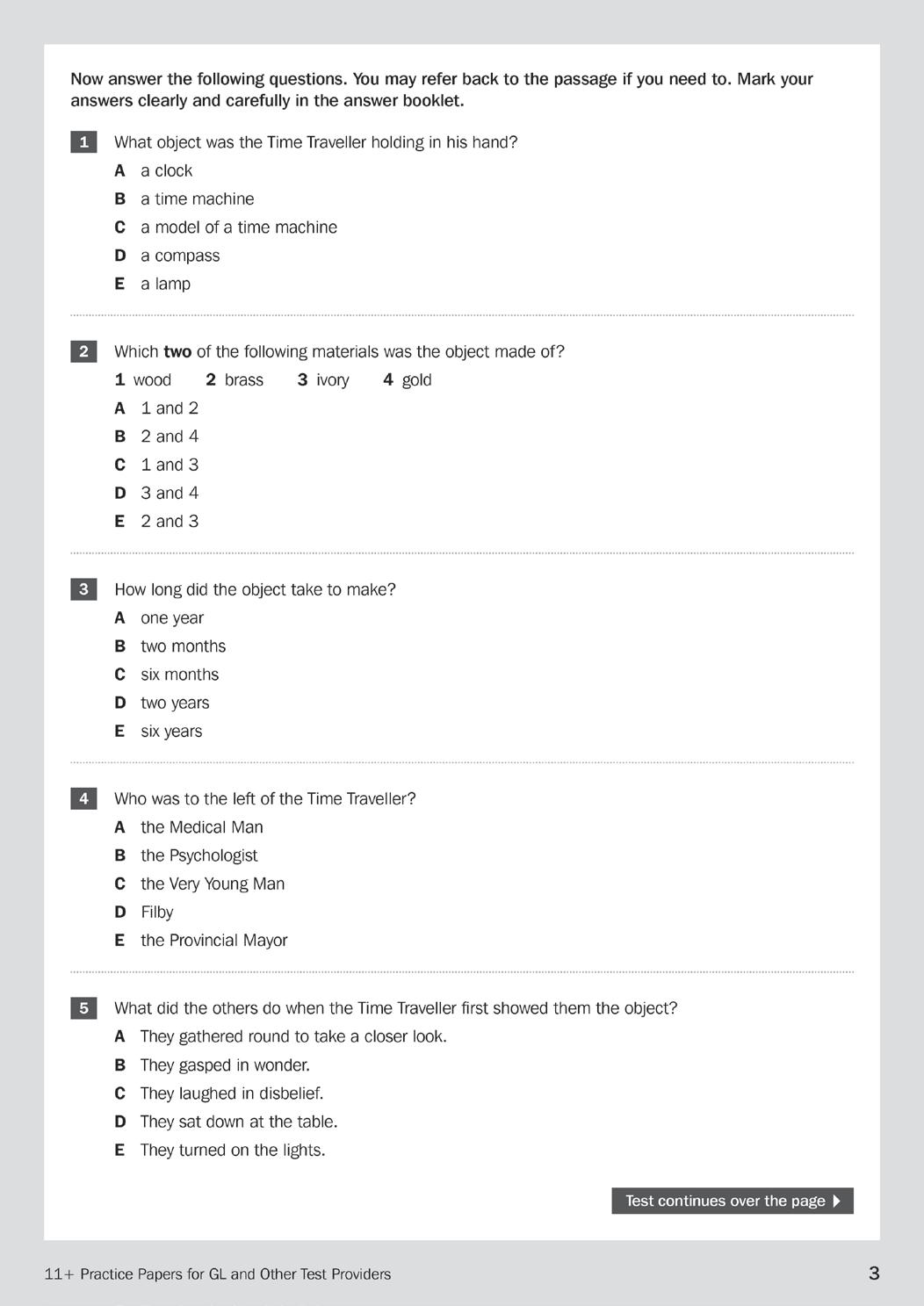
 Rebecca Brant and Siân Goodspeed
Rebecca Brant and Siân Goodspeed
The 11+ Practice Papers for GL and Other Test Providers offer realistic test practice for children preparing to sit 11+ exams set by GL Assessment, as well as other school selection tests Carefully designed to replicate the format and content of GL papers, they help children to develop essential exam techniques while also building confidence and stamina
Ideal for use in the final stages of your child’s 11+ journey, the resource includes four complete GL-style test papers – one each for English, maths, verbal reasoning and non-verbal reasoning The English, maths and verbal reasoning papers have a time limit of 50 minutes and the non-verbal reasoning paper has a time limit of 35 minutes
Separate multiple-choice answer sheets that closely match the format of the answer sheets used in the actual exam are provided for all the papers, allowing children to practise this crucial exam technique Both the papers and answer sheets are published loose in a card wallet, together with guidance notes and full explanations to all the questions
11+ Practice Papers for GL and Other Test Providers 978 07217 1477 6
Understanding Verbal Reasoning includes the following question types:
• word and letter patterns
• vocabulary
• spelling
• number patterns
• problem solving.
Understanding Non-verbal Reasoning includes the following question types:
• similarities and differences
• missing and hidden shapes
• cubes, codes and animations.
Understanding Reasoning
Siân Goodspeed and Rebecca Brant
Understanding Reasoning is a mini-series of study books designed to help pupils understand how to answer reasoning questions of the kind that appear in the 11+ and other school selection tests The two books in the series look separately at verbal and non-verbal reasoning, providing step-by-step explanations and examples, together with practical workbook-style activities A combined index and glossary ensures that pupils understand the vocabulary required for the explanation and discussion of question content


Each study book includes:
• an Explanation to introduce each topic
• practice Activities to consolidate and revise techniques
• Helpful hints giving extra information on how to approach activities
• extra Practice pages at the end of each section
• helpful Tips for tests and advice on how to revise effectively
• answers to all the questions in the book
Understanding Verbal Reasoning 978 07217 1207 9
Understanding Non-verbal Reasoning 978 07217 1208 6
Understanding Maths
Hilary Koll and Steve MillsUnderstanding Maths is a series of eight topic-based study books, plus a separate Practice book, designed to help pupils understand, appreciate and use maths at Key Stage 2 As well as featuring detailed explanations and targeted practice of key topics, each book also offers extensive opportunities for problem solving in real-life contexts

Ideal for use as preparation for the Key Stage 2 tests, each study book includes:

• an Explanation to introduce each topic
• extensive practice Activities to consolidate and revise knowledge and skills
• thought-provoking ‘Did you know?’ facts and information
• regular Progress tests and a Final test to track pupils’ development
• answers to all the questions in the book
The additional Practice book features extra questions on all the topics covered in the other books, with cross-references back to relevant pages in the study books to support further revision See pages 98–99
See pages 97 and 99 for topic-based maths and science study books.
Understanding English
Carol MatchettUnderstanding English is a series of seven topic-based study books, plus a separate Practice book, designed to help pupils understand, appreciate and use English at Key Stage 2 As well as featuring detailed explanations and targeted practice of key topics, each book also offers ideas for further pupil-led activities and projects
Ideal for use as preparation for the Key Stage 2 tests, each study book includes:
• an Explanation to introduce each topic
• extensive practice Activities to consolidate and revise knowledge and skills

• thought-provoking ‘Did you know?’ facts and information
• Now you try activities to develop pupils’ understanding of English outside the classroom
The additional Practice book features extra questions on all the topics covered in the other books, with cross-references back to relevant pages in the study books to support further revision

Punctuation
978 07217 1291 8
Grammar
978 07217 1292 5
Spelling
978 07217 1293 2
Vocabulary
978 07217 1294 9
Poetry 978 07217 1295 6
Fiction
978 07217 1296 3
Non-fiction 978 07217 1297 0
Practice 978 07217 1298 7
Understanding Science
Penny JohnsonUnderstanding Science is a series of six topic-based study books designed to help pupils understand, appreciate and apply science at Key Stage 2 Each book contains detailed explanations and targeted practice designed to build pupils’ scientific knowledge and understanding The importance of ‘working scientifically’ is emphasised throughout the series, with pupils encouraged to use and apply investigation skills, such as predicting results, analysing evidence and planning a fair test, when answering questions
Each study book includes:
• a concise Explanation to introduce each topic
• extensive practice Activities to consolidate and revise knowledge and skills

• thought-provoking ‘Did you know?’ facts and information
• a Glossary of scientific language

• a Scientific investigation summary
• answers to all the questions in the book Our Bodies 978 07217 1285 7
SATs 10-Minute Tests
KS1 KS2
Carol Matchett, Rachel Lopiccolo, Steve Mills, Hilary Koll and Belle Cottingham
The SATs 10-Minute Tests are short, timed tests designed to build speed, accuracy and confidence Ideal for independent work sessions at home, there are eight books in total, one for each of the four areas tested at the end of each key stage



The KS1 and KS2 SATs Grammar, Punctuation and Spelling 10-Minute Tests provide targeted practice of the key language skills tested in the SATs Each book contains 18 Grammar and Punctuation tests featuring a mixture of multiple-choice, matching and short- and long-answer questions There are also regular Spelling tests presented as cloze sentences with an accompanying script for parents to read aloud to their child
The KS1 and KS2 SATs Reading 10-Minute Tests allow children to practise exam-style comprehension questions in manageable 10-minute sessions, before progressing to full-length papers Each book contains 22 tests based on high-quality texts covering a range of genres and subjects, from classic works by George Bernard Shaw and Dick King-Smith, to contemporary fiction from Cornelia Funke and a biography of Mo Farah
KS1 SATs Grammar, Punctuation and Spelling 10-Minute Tests 978 07217 1499 8
KS2 SATs Grammar, Punctuation and Spelling 10-Minute Tests 978 07217 1495 0
KS1 SATs Reading 10-Minute Tests 978 07217 1498 1
KS2 SATs Reading 10-Minute Tests 978 07217 1497 4
The KS1 and KS2 SATs Arithmetic 10-Minute Tests provide short, sharp bursts of practice to develop children’s mental calculation skills and number fluency Each test begins with two warm-up questions, followed by a set of context-free, timed calculations covering a range of mathematical operations, including addition, subtraction, multiplication, division, fractions, decimals and percentages



The KS1 and KS2 SATs Reasoning 10-Minute Tests allow children to practise their mathematical reasoning and problem-solving skills in a wide variety of contexts spanning all areas of the primary maths curriculum Both books contain a mixture of topic-specific tests and mixed tests: 12 topic tests and 8 mixed tests at Key Stage 1, and 16 topic tests and 8 mixed tests at Key Stage 2
All the books feature a child-friendly introduction, Progress chart for recording test scores and pull-out answer booklet containing answers to all the questions in the book, as well as full instructions for using the tests and guidance on marking
Questions are presented in a similar style and format to those in the actual tests.
Questions increase in difficulty both within each test and as children progress through the book.
KS1 SATs Arithmetic 10-Minute Tests
978 07217 1492 9
KS2 SATs Arithmetic 10-Minute Tests 978 07217 1493 6
Answers include workings and explanations where appropriate.
KS1 SATs Reasoning 10-Minute Tests
978 07217 1494 3
KS2 SATs Reasoning 10-Minute Tests 978 07217 1496 7
SATs Revision Guides
Hilary Koll, Steve Mills and Carol MatchettThe SATs Revision Guides are closely matched to the National Curriculum and help children to revise what they have learnt at school, in preparation for the end-of-key-stage tests Clear explanations, worked examples and colourful illustrations help to keep children engaged, while also ensuring that information is presented in a way that is easy for them to understand and remember The accessible format and index enable children either to work through the topics in order, or to focus on a particular subject area


There are four SATs Revision Guides available, covering maths and English at both Key Stage 1 and Key Stage 2 Additional features of the guides include:

• helpful Tips for tests and general advice on how to revise effectively
• Remember boxes to summarise key information
• regular ‘Test yourself’ questions and answers to check recall of information
• a ‘Glossary’ to encourage the correct spelling and use of subject vocabulary
Answers to all the Test yourself questions are provided at the back of the book.
Both the Key Stage 1 and Key Stage 2 Reading papers feature a separate full-colour reading booklet.

SATs Practice Papers
Hilary Koll, Steve Mills, Carol Matchett, Sarah-Anne Fernandes and Giles ClareThe SATs Practice Papers feature up-to-date practice material for pupils preparing to sit the national tests in 2022 and beyond Closely matched to the National Curriculum test frameworks, the papers mirror both the appearance and content of the tests, providing realistic practice of exam-style questions

Separate timed papers are provided for all of the individual components of the maths and English tests at each key stage, as follows:
• KS1 SATs Practice Papers comprises one Arithmetic paper; one Reasoning paper; two Reading papers; one Grammar and Punctuation paper; and one aural Spelling test

• KS2 SATs Practice Papers comprises one Arithmetic paper; two Reasoning papers; one Reading paper, one Grammar and Punctuation paper; and one aural Spelling test
Each set of practice papers is published loose in a durable card folder in order to provide as authentic a test experience as possible Each folder also includes a separate Notes and answers booklet containing instructions for using the papers and detailed mark schemes
KS1 SATs Maths and English Practice Papers 978 07217 1652 7
KS2 SATs Maths and English Practice Papers 978 07217 1651 0
Science Revision Guides
Penny Johnson
The Key Stage 1 and Key Stage 2 Science Revision Guides help children to revise the biology, chemistry and physics topics that they have learnt at school Closely matched to the National Curriculum, each guide provides detailed explanations and targeted practice, as well as guidance on working scientifically Attractive illustrations and engaging examples help bring revision to life, while a comprehensive index means that pupils can either work through the topics in order or focus on a particular area
Each revision guide features:
• helpful Tips for tests and advice on how to revise effectively
• Remember boxes to summarise key information
• regular Test yourself questions and answers to check recall of information
• a Glossary to encourage the correct spelling and use of scientific vocabulary


Key Stage 1 Science Revision Guide 978 07217 1368 7

Key
07217 1369
See page 103 for maths and English practice papers.
Key Stage 2 Science Practice Papers
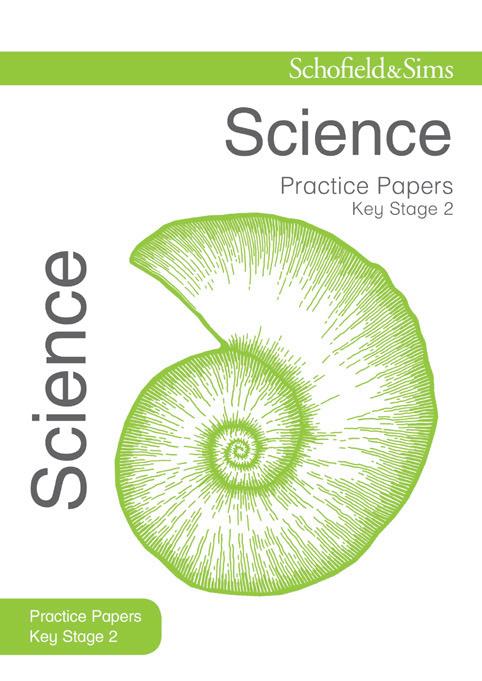
Penny Johnson
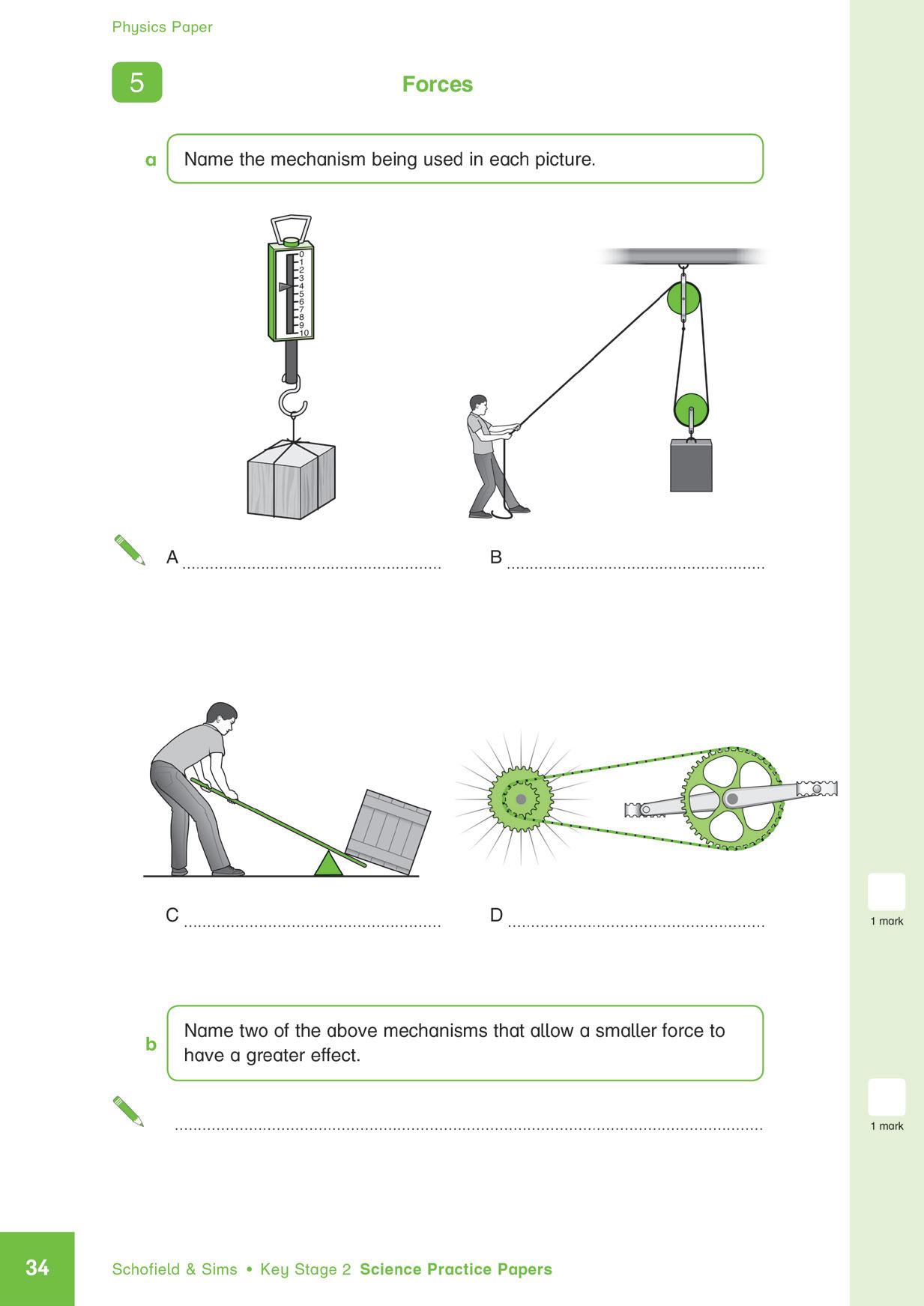
The Key Stage 2 Science Practice Papers are closely matched to the Key Stage 2 Science curriculum and reflect the appearance and content of the Key Stage 2 Science Sampling Test A flexible resource, the papers may be used either independently for formal test practice, or alongside the accompanying revision guide to build confidence and identify gaps in understanding
A total of three papers are included, comprising:
• Biology Paper (25 minutes)
• Chemistry Paper (25 minutes)
• Physics Paper (25 minutes)
Full instructions on using the papers provide reassurance and help familiarise pupils with the format of a formal test Each book also includes a detailed mark scheme to help you assess whether children are meeting the expected standard
My
Homework
Diary
My Homework Diary provides children with structured A5 pages for noting homework tasks, and a spelling rule for the week, as well as grids for timetables, class rules and individual targets




A reference section provides information on the following:
• Maths facts, including times tables, types of angles, shapes, measures and the 24-hour clock
• English facts, including punctuation and grammar rules
• a glossary of Science facts
• a list of Useful words in French, Spanish and German
• History timelines covering prehistory, early history and the history of Britain
• Geography facts, including continents and The Seven Wonders of the Ancient World
My School Diary
My School Diary helps to ensure strong home–school communication and encourages children to take ownership of their work This A5 book includes:
• Homework diary pages for the whole school year, featuring Date due and Comments boxes
• a structured Reading log with space to record the book title, pages read and an adult’s observations
• pages for children to fill in their school timetable, class rules and personal learning targets
• helpful homework tips for children, parents and carers
• useful reference pages, including a world map, multiplication square, punctuation pyramid and vocabulary lists
My Reading Record for Key Stage 1
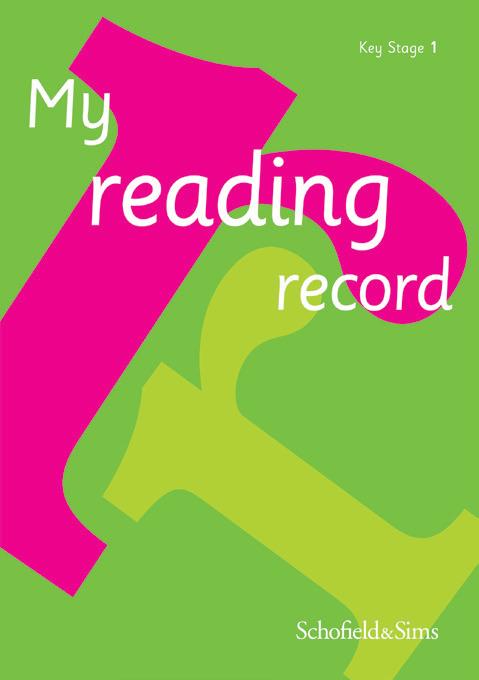

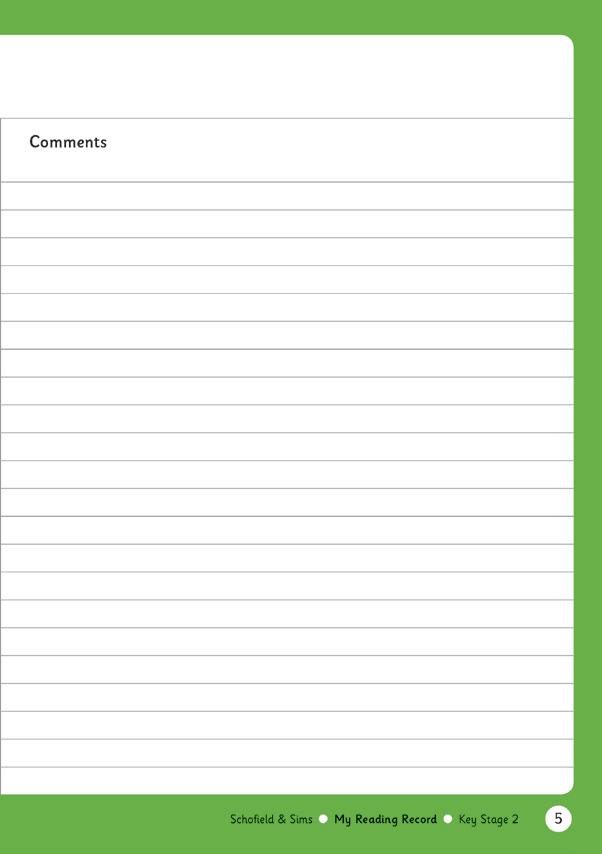



My Reading Record for Key Stage 1 is a handy A5 book designed to help schools to ensure effective home–school communication Structured fill-in pages ask parents to note specific points concerning their child’s reading at home, while word and sound checklists enable parents to track reading vocabulary Other parts of the book allow the teacher to give parents information specific to the child, such as Reading targets General notes explain the importance of reading at home, briefly describe the book banding system and outline the priorities for children’s reading at Key Stage 1
My Reading Record for Key Stage 2
My Reading Record for Key Stage 2 is a handy A5 book designed to help schools to ensure effective home–school communication It includes structured fill-in pages, vocabulary checklists and a helpful list of Words about reading Teachers can use the book to note specific reading targets and letter sounds that the child needs to practise General notes explain the importance of reading at home, provide a short description of the book banding system and outline the priorities for children’s reading at Key Stage 2
My Word Book
My Word Book encourages children to learn new words and to use them accurately in their own writing It can be used across subject areas to help children recognise words and spelling patterns, record new vocabulary and build their word power

This A5 illustrated book contains:
• approximately 800 words arranged alphabetically – with suffixes shown in red
• more than 300 further words arranged by word type or theme – including Story words and Feelings words

• a list of more than 100 Tricky words that children are likely to encounter in Key Stage 1
Space is also provided for the teacher to note the child’s specific targets in writing; any other adult working with the child may note the child’s progress towards meeting them

Bright illustrations help children to remember word meanings.
Suffixes are shown in red to highlight word structure and demonstrate the rules of spelling.
Blank spaces allow children to add in new words as they discover them.
My Word Book 978 07217 0961 1
Children are encouraged to apply the spellings in context at the end of each set.
My Spelling Book
My Spelling Book allows children to record and practise new spellings using the strategy, ‘Look, Say, Cover, Write, Check’ Perfect for weekly spelling practice, the book contains space for 40 sets of 15 spellings After each set of spellings, a short writing activity encourages children to use the spellings in context

This A5 book also contains:
• useful tips for parents and carers about how to help children to practise spelling at home


• a detachable card bookmark, which children can use to cover up spellings while they practise writing them
• space for the teacher to note the child’s specific targets in spelling, and for any adult working with the child to note the child’s progress towards meeting them
• handy copies of the statutory word lists for Years 3 to 6 for reference
• space for the child to note down any particularly tricky spellings requiring further practice
Replacement copies of the bookmark can be downloaded for free from the Schofield & Sims website My Spelling Book 978 07217 1653 4
Word Puzzles
Celia Warren
Word Puzzles have been specially written for Key Stage 2 children to work through independently Carefully graded and challenging, the puzzles help children to develop the literacy skills that they need in school, as well as the thinking skills that are valuable in every aspect of their lives


The book contains puzzles that are to do with words, letters, reading, writing and logic Worked examples and useful hints are provided and children are encouraged to check their answers against the correct solutions given
The puzzles in this book include:
• word chains
• link words

• word squares • riddles
• hidden words • word searches
• crosswords
• sudoku
Number Puzzles
Ann Montague-Smith
Number Puzzles have been specifically written for Key Stage 2 children to work through independently Carefully graded and challenging, the puzzles help children to develop the mathematics skills that they need in school, as well as the thinking skills that are valuable in every aspect of their lives



Number Puzzles contains puzzles that are to do with numbers and logic and encourage children to develop their problem-solving strategies Worked examples and useful hints are provided and children are encouraged to check their answers against the correct solutions given
The puzzles in this book include:
• sudoku
• magic squares • grand totals
• kakuro • Latin squares
• arithmagons • multiplication pyramids








Geography and history posters
Map of Europe

978 07217 0934 5

Map of UK and Ireland
978 07217 0938 3
Map of the World 978 07217 5596 0
Peters World Map

978 07217 0933 8
World Political Map

978 07217 0927 7
British History Timeline 978 07217 1161 4
World History Timeline 978 07217 0941 3
British History Timeline (super-jumbo)
978 07217 1201 7
History of the Planet Earth (super-jumbo)

978 07217 1202 4
World History Timeline (super-jumbo)
978 07217 1200 0
Africa
Botswana
Sebilo Pty kbsech@sebilobooks co bw
Egypt
Cairo Trade Centre ctc@access com eg Global Publishing & Distribution Co. global@globalbooksegypt com
Gambia
Timbooktoo timbooktoo@qanet gm
Ghana Cinederick cinederick@yahoo com Kingdom Books petergyateng@yahoo com www kingdomgh com
Middle East
Bahrain
Elmia Bookstores kumar@elmia-gcc com www elmia-gcc com
Majestic Promotions Company W.L.L. info@mpcwll com MECON mecon@batelco com bh www meconbahrain com
Jordan Steps for Educational Services yamanoz@yahoo com Kuwait
Saeed & Samir Bookstore Co saeed samir bookstore 76@gmail com
Minerva Books minervabooksltd@gmail com Vidya Bookstore vidyabookstore@gmail com
Kenya
Text Book Centre Ltd sales@tbc co ke www textbookcentre com
Mauritius Edubooks Co Ltd edubooks@orange mu
Nigeria
Chelis Bookazine info@chelisbookazine com www chelisbookazine com
Doreona Books info@doreonabooks com
IECS
info@iecs education Rombic Concepts ceo@rombicconceptsltd com
Seychelles Antigone Bookshop antigonebookshop@email sch
South Africa
Caxton Books jferreira@caxtons co za www caxtons co za
Tanzania Eduzone Intl eduzintl@gmail com
Lebanon Levant Distributors schools orders@levantgroup com www levantgroup com
Librairie Antoine Siham abboud@antoineonline com www antoineonline com
Oman Oman International Book House omanintel@omantel net om
Saudi Arabia
Dar Al Jadawel Publishing & Distribution dhar@aljadawel sa www aljadawel sa
Numo Al-Elmia noor mohamed@alelmia com www alelmia com
The Americas
Barbados
Brydens Retail Inc pencils@caribsurf com www brydensxpress com
Days Bookstore enquiries@daysbookstore com www daysbookstore com
Chile Books & Bits yduran@booksandbits cl
Dominica Jays Ltd jays@cwdom dm
WBCO abdullah@wbco sa www wbco sa
United Arab Emirates
All Prints Distributors & Publishers allprints@allprints ae www allprints ae
Arora Book Centre info@arorabooks com www arorabooks com
Kinokuniya Book Store dubai@kinokuniya com www kinokuniya com
Magrudy Enterprises LLC bookbuying@magrudy com www magrudy com
North America Amazon USA www amazon com
sales@schofieldandsims.co.uk
Europe
Cyprus
Academic & General Bookshop academic&general@cytanet com cy K P Kyriakou Ltd kpk info@books com cy
Czech Republic
ADC Blackfire Entertainment doug w@blackfire cz www blackfire-edu cz
Denmark English Center ec@englishcenter dk www englishcenter dk
Germany
Buchhandlung Bollinger mcmribollinger@aol com www buchhandlung-bollinger de
Asia
China
Shanghai Book Traders yuxiaoming@sbt cn www sbt cn
Hong Kong Hong Kong Book Centre Ltd orders@hkbookcentre com www hkbookcentre com
Transglobal Publishers Service Ltd info@transglobalpsl com www transglobalpsl com
India
Overleaf overleaf@vsnl net www overleaf co in
Pakistan
Publishers Marketing Associates pma@cyber net pk www pma com pk
Australasia
Australia
Amazon Australia www amazon com au
Ireland
Eason & Son www easons com
Edward Jennings School Supplies leabharscoile@gmail com
Malta
Merlin Library mail@merlinlibrary com www merlinlibrary com
Netherlands
Transmedia info@transmedia nl www transmedia nl
Poland
Prospectus – inicjatywy edukacyjne biuro@prospectus edu pl www prospectus edu pl
Spain
Libreria L’Escala info@libreriaescala es www libreriaescala es
Sweden
Utbildningsstaden AB info@utbildningsstaden se www utbildningsstaden se
Turkey
M Kemal Deniz & Co Ltd mustafa safakogullari@denizplaza com www denizplaza net
Sinirsiz Egitim Hizmetlebri Ltd info@eltturkey com www eltturkey com
Malaysia
Emo Book Services Sdn Bhd vincent@emobooks com www emobooks com MPH Bookstores jacquiewong@mph com my www mphonline com
Tek Distributors customerservice@tekgroup my www tekbookmart com
University Book Store Malaysia Sdn Bhd enquiry@ubsm com my www ubsm com my
Myanmar
Myanmar Book Centre info@myanmarbook com www myanmarbook com
Sri Lanka
Jeya Agency (Pvt) Ltd tjeya@slt lk www jeyabookcentre com
Zubair Makeen & Sons zms@sltnet lk www makeenbooks com
Thailand
A Square E Corporation Ltd varangsinee@a2e co th www a2e co th
Development Media Education bodin-dme@hotmail com
Learning Tree Co Ltd learningtreethailand@gmail com
Vietnam
Vietnam Book Promotion Service thao@vietnambookpromotion com
Fiji
Suva Book Shop suvabookshop@connect com fj
Papua New Guinea Birdwing PNG rjacksonpng@gmail com
A Time to Speak and a Time to Listen 58–59 Alphabet (poster) 112
B
British History Timeline (poster) 113
C
Complete Comprehension 52–53 Complete Primary Dictionary, The 50
D
Daisy Lane Home–School Readers 8–9 Days of the Week (poster) 112
E
Early Comprehension 51
Eleven Plus Practice Papers 94–95
Eleven Plus Progress Papers 92–93
Eleven Plus Rapid Tests 88–91
Eleven Plus Study and Practice Books 86–87 English Skills 42–44
F
First Comprehension 54–55
First Dictionary 47
First Dictionary and Thesaurus Activities 49
First Illustrated Dictionary 46
First Mental Arithmetic 66–67, 70
First Thesaurus 48 Fractions, Decimals and Percentages 76–79
G
Get Set Early Years 4–7 Grammar and Punctuation 38–41
H
Handwriting Practice 29
History of the Planet Earth (poster) 112 Home–School Guides to Reading 8–9
K
KS1 Problem Solving 80
KS2 Comprehension 56–57
KS2 Problem Solving 81
L
Learn Your Times Tables 64
M
Map of Europe (poster) 113
Map of the World (poster) 113
Map of UK and Ireland (poster) 113
Mental Arithmetic 68–69, 71
Mental Maths 60
Multiplication Square (poster) 112
My Homework Diary 106
My Letters and Sounds Classroom Kits 27
My Letters and Sounds Decodable Readers 20–26
My Letters and Sounds e-reader Library 26
My Letters and Sounds Phonics Practice Pupil Books 18–19
My Letters and Sounds Phonics Training 28
My Letters and Sounds Teacher’s Handbooks 14–17
My Reading Record for Key Stage 1 107
My Reading Record for Key Stage 2 107
My School Diary 106
My Spelling Book 109
My Times Tables Book 63
My Word Book 108
N
Number Book 60
Number Puzzles 111
Numbers (poster) 112 Nursery Books 10–11
P
Peters World Map (poster) 113 Picture Dictionary 45 Primary Practice 82–85
S
SATs 10-Minute Tests 100–101
SATs Practice Papers 103
SATs Revision Guides 102 Science Practice Papers 105 Science Revision Guides 104 Spelling 34–37
T
Telling the Time 61
Telling the Time (poster) 112 Times Tables 1–6 (poster) 112 Times Tables 7–12 (poster) 112 Times Tables Practice 65 Times Tables Tests 62
U
Understanding English 98
Understanding Maths 97
Understanding Reasoning 96
Understanding Science 99
W
Word Puzzles 110
World History Timeline (poster) 113
World Political Map (poster) 113
WriteWell 30–33
WriteWell (poster) 112
Written Calculation 72–75
Placing your order
How to order
Online
You can order quickly and easily online by visiting www.schofieldandsims.co.uk
New customers can either set up an account or order as a guest. By creating an account you will be able to save your shipping address and view your complete order history. For those looking to place a large order at speed, our Quick order web page (www.schofieldandsims.co.uk/quick-order) allows you to add multiple titles to your basket at the same time.
By phone
You can order by telephone from 8.00 a.m. to 5.00 p.m., Monday to Friday, by calling our friendly Customer Service team on 01484 607080. Please ensure that you have the ISBNs for the products that you wish to order and your delivery address and payment details to hand when you do.
By post, fax or email
Completed order forms, purchase orders and other paper orders should be posted to:




Schofield & Sims Ltd 7 Mariner Court Wakefield West Yorkshire WF4 3FL
Alternatively, you may fax your order to 01484 606815 or email it to sales@schofieldandsims.co.uk
Payment
Orders can be paid for:
• by debit card, credit card or PayPal
• on account (schools, nurseries, playgroups, bookshops and other retailers only)
• by requesting a pro forma invoice.
Cheques should be made out to Schofield & Sims Ltd and orders from private individuals must include full payment details. We request that you do not send cash.
Delivery
Deliveries to the UK are normally made within three working days, while deliveries to Europe and the rest of the world take from five to ten days. All deliveries are tracked and the following rates apply:
• Delivery to the UK is free on orders over £30.00. Orders under £30.00 attract a flat £3.95 delivery charge.
• Delivery to Europe and throughout the rest of the world is charged at a standard business rate based on the size and location of the order.
Trade and export customers
For information on discounts, payment terms and delivery options for UK book trade and international customers, or to place an order, please contact our Trade and International Sales Manager: Vincent Jackson +44 (0)1484 601717 vincent@schofieldandsims.co.uk
To find details of your local stockist, agent or distributor, please refer to the International stockists section on pages 98–99 or visit www.schofieldandsims.co.uk/international
